Step by Step Installing Oracle Database 10g Release 2 on Linux (CentOS) and AUTOMATE the installation using Linux Shell Script
Posted by Kamran Agayev A. on May 1st, 2009
Note: Before reading the post, you can have a look to my latest VIDEO instruction on Installing OEL and Oracle 10gR2
In order to use Oracle Database, first of all we need to setup Oracle Software. Installation of Oracle Database on Windows is very easy. By running setup.exe from installation CD of Oracle for Windows, we can invoke a setup and by clicking NEXT buttons we can install Oracle Software and Database without any problem. We don’t need any prerequisite actions before installation. But in Linux it’s different. If we want to install Oracle Database on Linux OS, we should follow some prerequisite actions.
Today, we’re going to install Oracle Database on CentOS. To do it, we use last version of CentOS (the latest release for now) – “CentOS-5.2” and mostly used release of Oracle Database – “Oracle Database 10g Release 2”. And we’re going to practice this whole project on VMware 6.0.0
Before starting, we need to install VMware. Then, we need to install CentOS on VMware. After that, we are going to install Oracle Database. You should refer to my previous posts in order to install VMware and Centos
Step by step installing VMware
Step by Step Installing CentOS on VMware
But there’s one thing we should keep in mind. During installation of CentOS, on the “package lists” page, we should behave differently. It will be discussed in the next paragraphs.
This project covers following steps:
- Checking minimum hardware requirements
- Installing rpm packages which are required for Oracle installation
- Configuring kernel parameters
- Creating groups and user for Oracle Installation
- Installing Oracle Software
- Creating an Oracle Database
- Connecting to Database with Enterprise Manager
- AUTOMATING all processes and steps of installation Oracle 10g R2 on Centos using Shell Script
As you see from the list above, in order to setup Oracle Database, we need to change some parameters in the system. Changing these parameters each time could lead to mistakes and waste of time. The main purpose of our article is to automate all these processes and save your time. For this purpose we’re going to use “Shell Script”
Now I’m going to explain above mentioned steps one by one
1. Checking minimum hardware requirements
At least, your system should meet the following requirements:
– 1GB RAM
– Requirement for swap space in Oracle installation is as follows:
Available RAM Swap Space Required
Between 1 GB and 2 GB 1.5 times the size of RAM
Between 2 GB and 8 GB Equal to the size of RAM
More than 8 GB .75 times the size of RAM
– 400MB free space in /tmp directory
– Depending on type of the installation, 1.5-3.5 GB free space for Oracle Software
– 1.5GB free space if new Oracle Database is created
Getting familiar with requirements mentioned above, we need to get hardware information of our system. To check the size of RAM, Swap space and tmp directory, we run these commands:
– To check the size of physical memory, execute grep MemTotal /proc/meminfo
– To check the size of swap space, execute grep SwapTotal /proc/meminfo
– To check the space in /tmp directory, execute df –h /tmp
2. Installing rpm packages which are required for Oracle installation
While installing CentOS, we have to install some rpm packages. During the installation, on the installation window you get list of packages. Here, we select “Customize” choice
On “Customized” window, we check required packages and uncheck packages that are not required for Oracle Installation
In the packages list, check following packages. Uncheck all packages that are not in the list below
Desktop Environments
GNOME Desktop Environment
Applications
Graphical Internet
Development
Development Libraries
Development Tools
GNOME Software Development
Java Development
Legacy Software Development
X Software Development
Servers
Server Configuration Tools
Web Server
Windows File Server
Base System
Administration Tools
Base
Java
Legacy Software Support
System Tools
X Window System
Furthermore, after installation of CentOS, we have manually to install these four rpm packages. Surely, you can select them (except libaio-devel package) from the package list during setup, for many people who don’t want to find these packages in the package list, installing it manually after system installation is the best option. These are packages which should be installed before Oracle installation
– compat-db-4.2.52-5.1.i386.rpm
– sysstat-7.0.2-1.el5.i386.rpm
– libaio-devel-0.3.106-3.2.i386.rpm
– libXp-1.0.0-8.1.el5.i386.rpm
In order to install these packages, you can use rpm –Uvh command by changing directory to CentOS directory inside the CD (DVD) of CentOS installation as shown below
3. Changes to be made to Kernel parameters
After installing above mentioned packages, we need to change some Kernel parameters and make them match to Oracle requirements. Parameters which should be changed are shown below
| shmmax | 2147483648 |
| shmmni | 4096 |
| shmall | 2097152 |
| shmmin | 1 |
| semmsl | 250 |
| semmns | 32000 |
| semopm | 100 |
| semmni | 128 |
| file-max | 65536 |
| ip_local_port_range | 1024 65000 |
| rmem_default | 1048576 |
| rmem_max | 1048576 |
| wmem_default | 262144 |
| wmem_max | 262144 |
We do all these changes in the /etc/sysctl.conf file by adding these lines to that file:
kernel.shmmax = 2147483648
kernel.shmall = 2097152
kernel.shmmni=4096
kernel.sem=250 32000 100 128
fs.file-max=65536
net.ipv4.ip_local_port_range=1024 65000
net.core.rmem_default=1048576
net.core.rmem_max=1048576
net.core.wmem_default=262144
net.core.wmem_max=262144
After appending those lines we save that file and run the following command to make these changes effective immediately in the running system
/sbin/sysctl –p
Setting Shell limits for the Oracle UserTo improve the performance of the software on Linux systems, you must increase the following shell limits for the oracle user:
1. Add the following lines to /etc/security/limits.conf file
oracle soft nproc 2047
oracle hard nproc 16384
oracle soft nofile 1024
oracle hard nofile 65536
2. Add the following lines to /etc/pam.d/login file
session required /lib/security/pam_limits.so
session required pam_limits.so
3. In order to use Oracle Software, we need to make a change in “oracle” user’s buffer size and number of opened file descriptors. In order to do it, we add below lines to /etc/profile file
if [ $USER = “oracle” ]; then
if [ $SHELL = “/bin/ksh” ]; then
ulimit -p 16384
ulimit -n 65536
else
ulimit -u 16384 -n 65536
fi
fi
4. Changing redhat-release file
One of the first checks performed by the Oracle Universal Installer (OUI) is to determine if the host platform is supported. The OUI uses the file /etc/redhat-release to determine the platform. For the case of Red Hat Enterprise Linux, Oracle Database 10g Release 2 expects either RHEL 3 or RHEL/OEL 4.
The easiest way to get around this error is to modify the /etc/redhat-release file replacing the current release information (CentOS release 5 (Final)) with the following:
redhat-4
Before modifying /etc/redhat-release, make a backup copy of the file and ensure to replace the original one after the Oracle installation and patch process has been completed.
cp /etc/redhat-release /etc/redhat-release.original
echo “redhat-4” > /etc/redhat-release
After all these configurations, you should get this result:
4. Create groups and user for Oracle Installation
In this step, we create “oinstall” and “dba” groups and “oracle” user to install Oracle Software, and create new Database
groupadd oinstall
groupadd dba
useradd -m -g oinstall -G dba -d /home/oracle -s /bin/bash -c “Oracle Software Owner” oracle
passwd oracle
5. Installing Oracle Database 10g Release 2
First of all, we need to download Oracle Database 10g R2. To download it, use this link:
http://download.oracle.com/otn/linux/oracle10g/10201/10201_database_linux32.zip
After download finish, we need to copy this file to the Virtual Machine. To copy it, we have two choices:
- Copy it using USB Flash Drive
- Copy it using Samba service
- Create an image file (.iso) from zipped installation and mount it to Virtual Machine
Here, we’re going to copy the zipped file using second technique. With any ISO creator program, create .iso file from zipped installation file of Oracle Database. And then mount it to the Virtual Machine as shown below:
Now switch to the desktop of CentOS, right click on DVD of CentOS installation on the desktop and click “Eject” as shown below:
Now enter to “Computer” and double click on “CD-ROM” icon.
Installation file of Oracle Database will be opened:
Now, create install folder on the /tmp directory, change owner of this folder to “oracle”, copy this file into /tmp/install directory
Then unzip this file and begin installation as follows:
After unzip completes, installation will begin automatically
Oracle Database 10g Installation
If you want to create new database after software installation, check “Create Starter Database” checkbox and enter database name and password, then click Next
Specify Inventory directory (keep it as default) and click Next
Here we see that all Prerequisite Checks succeeded.
Click Install to begin installation
Now, we’re installing Oracle 10g Software.
6. Creating an Oracle Database
As we’ve checked “Create Starter Database” at the first page of the installation, new database will be created automatically after software installation
After database created, you’ll get information about your database, Enterprise Manager and Spfile
Click Ok. In the below window, you’ll get location for two scripts which you should run as a root user to complete last configurations. Open new Terminal window and run those two scripts:
Installation of Oracle Database 10g completed successfully! Congratulations!
Now reboot your server and login as oracle user and start newly created database.
If we want to login to our database, we run sqlplus. But before it, we need to set Environment Variables. We can do it automatically by adding them to .bashrc file in the /home/oracle directory as below:
export ORACLE_HOME=/home/oracle/oracle/product/10.2.0/db_1
export LD_LIBRARY_PATH=$LD_LIBRARY_PATH:$ORACLE_HOME/lib
export PATH=$ORACLE_HOME/bin:$PATH
alias database =’export ORACLE_SID=kamran;sqlplus “/ as sysdba”‘
Now, let’s open new terminal and try again
As you see, after setting Environment Variables to their correct values, I was able to login to SQL*Plus using two ways.
7. Connecting to Database with Enterprise Manager
Now, let’s start Oracle Enterprise Manager. In order to use EM, we should firstly start listener. In production environment, you need automate database, listener and EM startup. To automate them, please refer to one of my previous blogs – “Automatically StartUp and Shutdown an Oracle Database in Linux OS”
Start the listener
Then, start Enterprise Manager
Now, we can login to EM page to administer our database using above given address:
http://localhost.localdomain:1158/em/
Enter user sys and its password, then select “SYSDBA” as a role and click Login
Using Enterprise Manager, you can administer your database in very easy steps
That’s all!! Our Database and EM is ready for use! Congratulations!!!
By following above mentioned steps we were able to install Oracle 10g R2 on CentOS 5. But if we carry out frequent tests and as a result of these tests each time we are to install Oracle Database, then we need to automate installation of Oracle Database. I would suggest two options to overcome this problem:
- To install CentOS+Oracle on VMware and copy image of VMware to elsewhere, then each time use this image to get fresh copy of Oracle Database
- To automate installation of Oracle Database by using Shell Script
Let’s explain each option in details:
- Firstly, I usually create new Virtual Machine with 10GB size. Then, I install CentOS on it and create an Oracle Database with all its configurations. Then I shut down Virtual Machine and copy all the folders to another directory. Usually, I create two copies of the Virtual Machine. Then I do all my tests on the first Virtual Machine. When it becomes useless, I shut down and delete it as a whole folder, open second Virtual Machine which I’ve copied and continue my tests.
- Second way is the best method of approach to the problem. For this, I create a shell script and write all steps and do all configuration changes from this script. By running this script once, all configurations needed for Oracle Installation will be changed automatically and we will only be asked for new oracle user’s password and next we’ll see installation page open.
Automating installation of Oracle Database 10g Release 2 on Centos 5 using Shell Script
To automate this job, we wrote a Shell Script. Before running this script, we should follow some steps as shown below:
1. Firstly you should know that before running this script we should create install directory in /tmp directory and copy zipped installation file of Oracle to this directory with this installation script
2. Before running this script we must be sure that installation DVD of CentOS has been inserted or installation DVD image of CentOS mounted to the system. You can check it by running this code:
3. After installation completes, change the following Environment Variables and alias name into proper names which you’ve used during installation in the .bashrc file
- ORACLE_HOME – If it is different folder, change it to correct value
- ORACLE_SID – If it is different SID, change it to correct SID
- As an alias, you can assign whatever you want
If everything is OK as mentioned above, we change directory to /tmp/install folder and run install.sh file. By running this shell script, all configurations needed for installation will be automatically changed and only thing asked will be oracle user’s password. After that we’ll see Oracle Database installation page. By clicking Next buttons we’ll be able to install Oracle Software and Database very easily
Now, let’s install Oracle Database 10g using this Shell Script
First of all, we need to create install folder in the /tmp directory and copy zipped installation file of Oracle Database 10g to /tmp/install directory with install.sh script and check their existence. After that we need to mount Centos DVD once more, because we’re going to install some packages that were not installed with CentOS. After getting below screen, you can start installation
Here we see that
- We have zipped installation file of Oracle Database 10g in the /tmp/install directory
- We mounted CentOS DVD
Now, switch to /tmp/install folder and run install.sh script
Here, enter oracle user’s password. Then click ok. After this step, zipped file will be unzipped
After it finishes unzipping, we’ll get Installation Window
That’s all! After getting this page, you should follow above mentioned installation steps in which we installed Oracle Database manually.
Using automatic install script we’ve avoided of all configuration settings and got Oracle 10gR2 installer page opened successfully
The automatic installation script for Oracle Database on Linux is as follows:
#########———— Installing Rpm files —–########
#Change directory to /tmp/install
cd /tmp/install
#Install all packages that are not installed during OS installation and that are required packages for Oracle Database 10gR2
echo “Installing rpm packages …”
rpm -Uvh “$(find /media/ -name compat-db*)”
rpm -Uvh “$(find /media/ -name sysstat*)”
rpm -Uvh “$(find /media/ -name libaio-devel*)”
rpm -Uvh “$(find /media/ -name libXp-1*)”
echo “Rpm packages installed
“
#Add lines to limits.conf file
echo “Changing limits.conf file”
cat >> /etc/security/limits.conf <<EOF
oracle soft nproc 2047
oracle hard nproc 16384
oracle soft nofile 1024
oracle hard nofile 65536
EOF
echo “limits.conf file changed successfully
“
#Add lines to profile to give maximum limit for Oracle user
echo “Changing /etc/profile file ….”
cat >> /etc/profile <<EOF
if [ \$USER = “oracle” ]; then
if [ \$SHELL = “bin/ksh” ]; then
ulimit -p 16384
ulimit -n 65536
else
ulimit -u 16384 -n 65536
fi
umask 022
fi
EOF
echo “/etc/profile file changed successfully
“
#Add line to /etc/pam.d/login file
echo “Changing /etc/pam.d/login file …”
cat >> /etc/pam.d/login <<EOF
session required /lib/security/pam_limits.so
EOF
echo “/etc/pam.d/login file changed successfuly
“
#Add some kernel parameters to /etc/sysctl.conf file
echo “Changing kernel parameters … “
cat >> /etc/sysctl.conf <<EOF
kernel.shmmax = 2147483648
kernel.shmall = 2097152
kernel.shmmni=4096
kernel.sem=250 32000 100 128
fs.file-max=65536
net.ipv4.ip_local_port_range=1024 65000
net.core.rmem_default=1048576
net.core.rmem_max=1048576
net.core.wmem_default=262144
net.core.wmem_max=262144
EOF
echo “Kernel parameters changed successfully
“
#Save all new kernel parameters
/sbin/sysctl -p
#Add “redhat-4” line to /etc/redhat-release file
echo “Changing /etc/redhat-release file …”
cp /etc/redhat-release /etc/redhat-release.original
echo “redhat-4” > /etc/redhat-release
echo “/etc/redhat-release file changed successfully
“
#Create new groups and “oracle” user and add this user to group
echo “Creating new groups and ‘oracle’ user …”
groupadd oinstall
groupadd dba
useradd -m -g oinstall -G dba -d /home/oracle -s /bin/bash -c “Oracle Software Owner” oracle
passwd oracle
echo “Groups and user created successfully
”
#Adding Environment Variables
#Adding Environment Variables
cat >> /home/oracle/.bashrc <<EOF
export ORACLE_HOME=/home/oracle/oracle/product/10.2.0/db_1
export LD_LIBRARY_PATH=$LD_LIBRARY_PATH:$ORACLE_HOME/lib
export PATH=$ORACLE_HOME/bin:$PATH
alias mydb=’export ORACLE_SID=mydb;sqlplus “/ as sysdba”‘
export ORACLE_SID=mydb
EOF
EOF
#Unzip setup of Oracle
echo “Unzipping setup of Oracle 10g Release 2…. “
unzip 10201_database_linux32.zip
echo “Setup file successfully unzipped
“
#Enter to installation directory and run the installation …
echo “Installation begins …”
cd /tmp/install/database
chmod 755 runInstaller
chmod 755 install/.oui
chmod 755 install/unzip
xhost +
sudo -u oracle /tmp/install/database/runInstaller




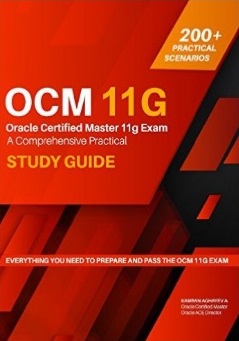

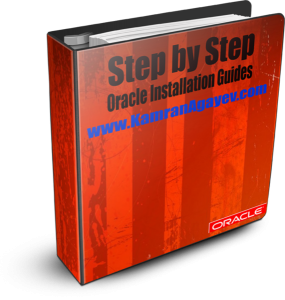

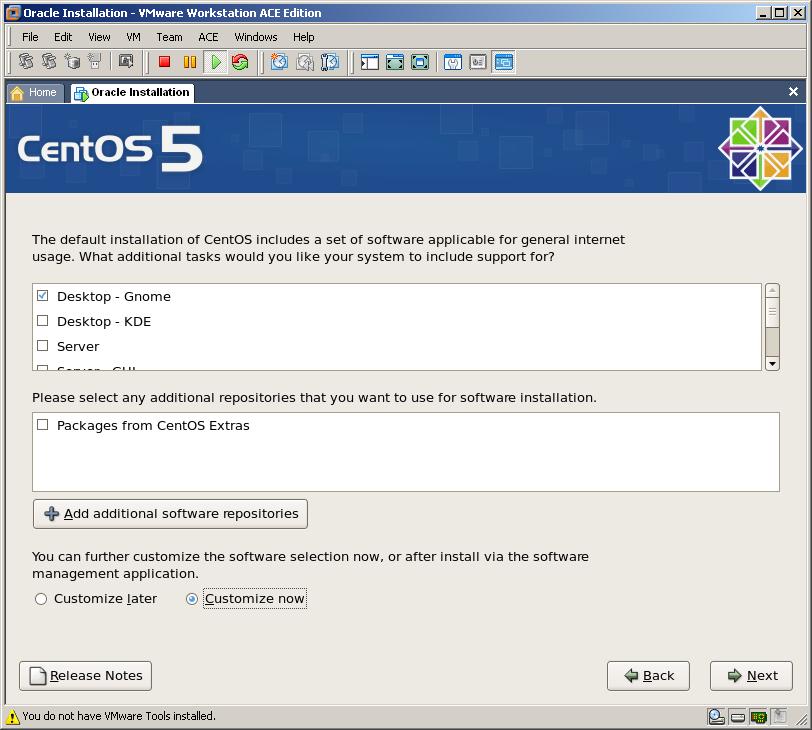
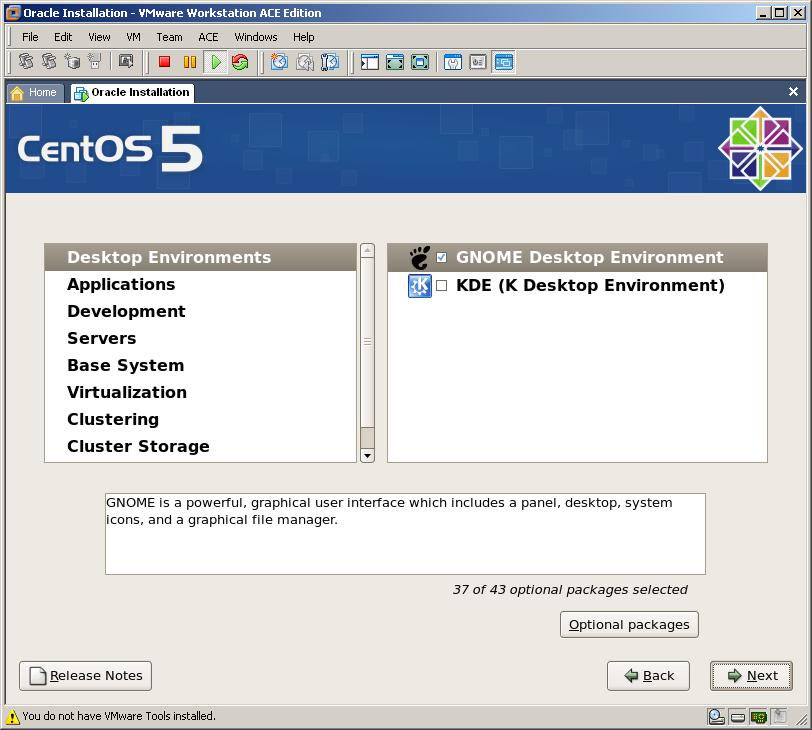
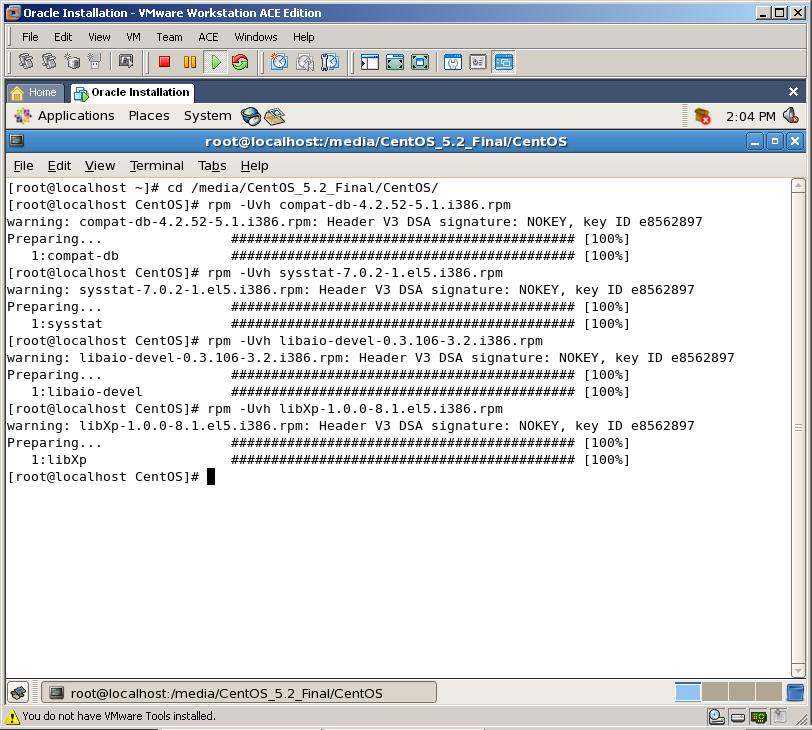
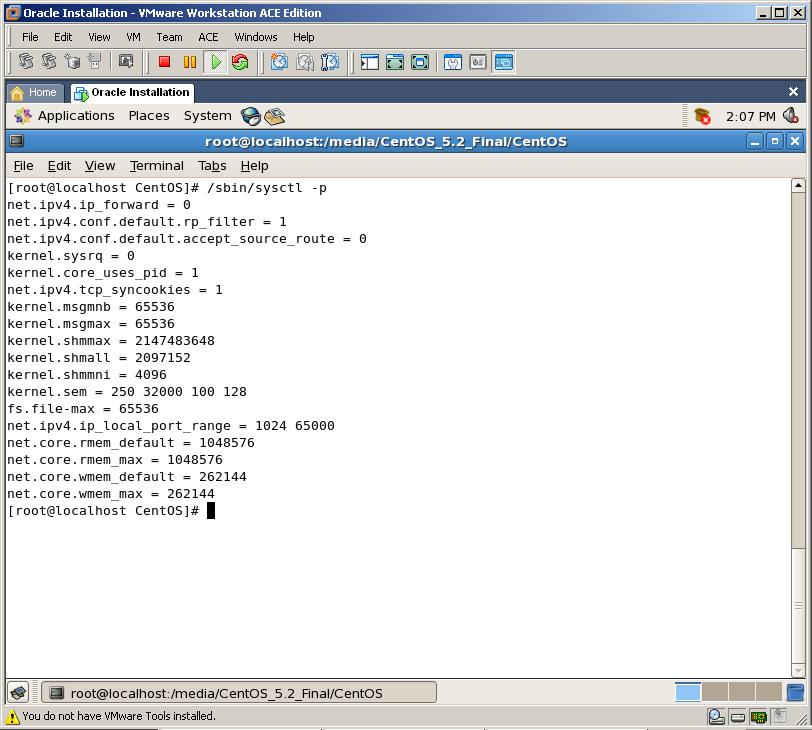
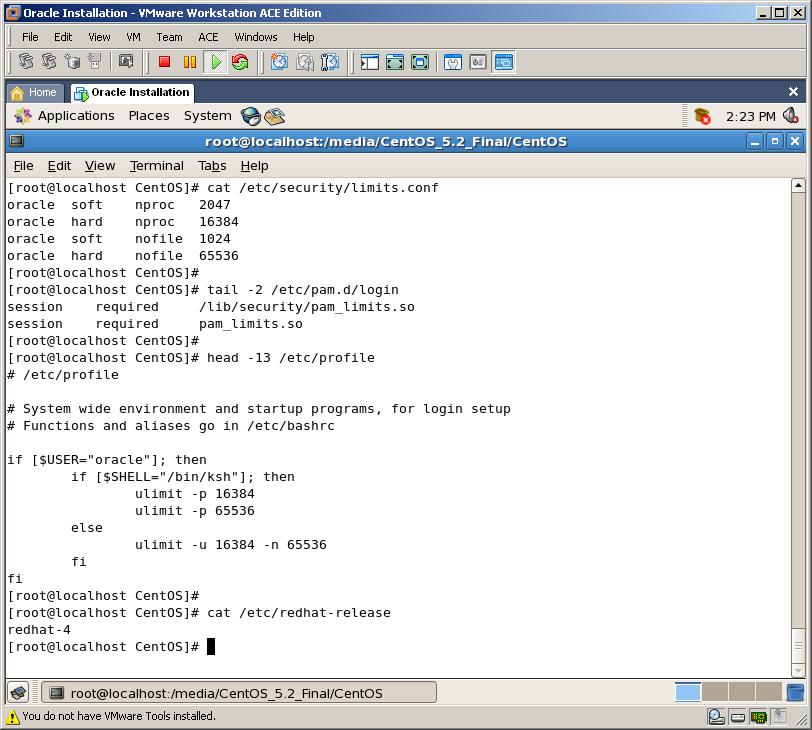
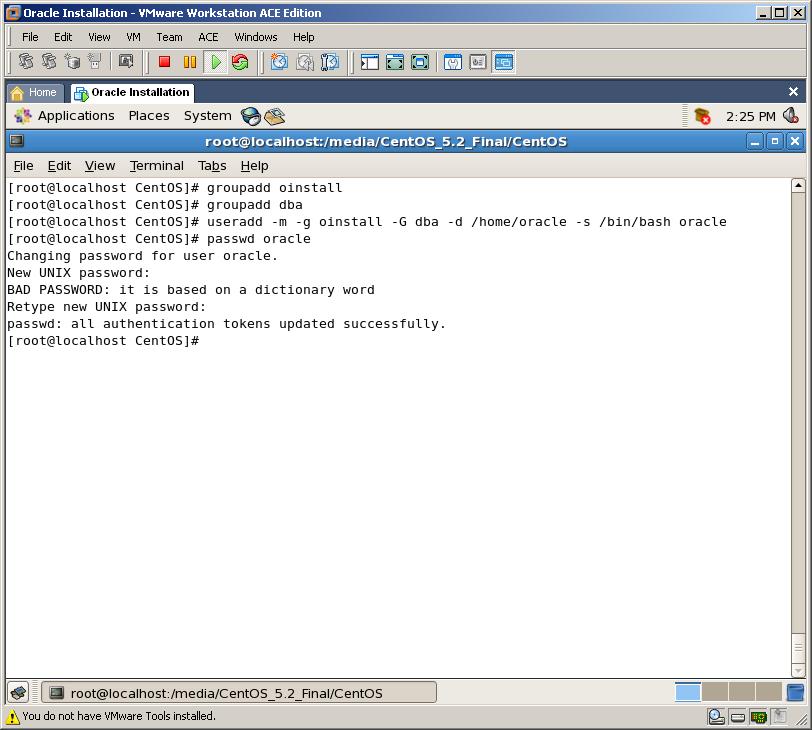
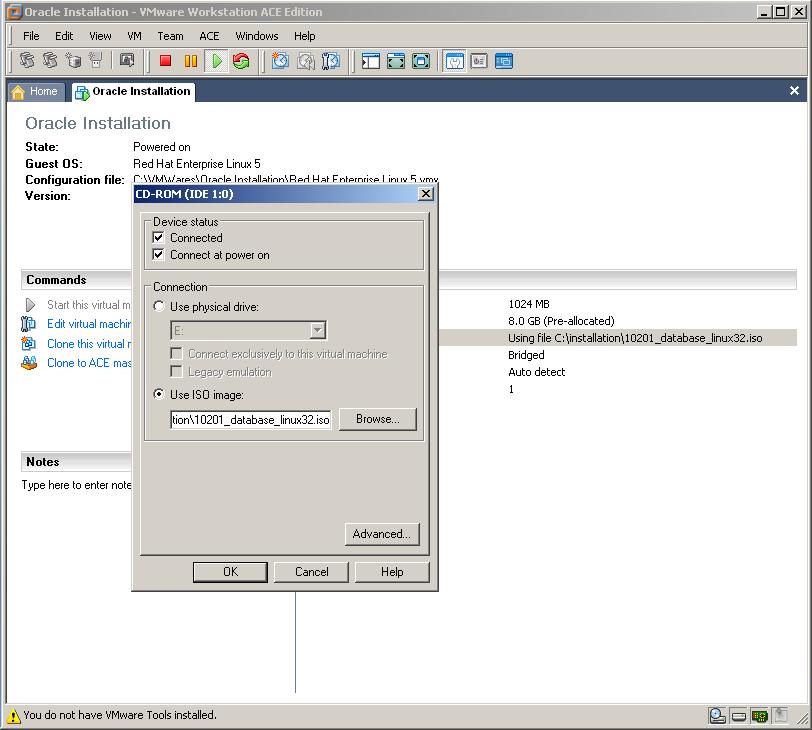
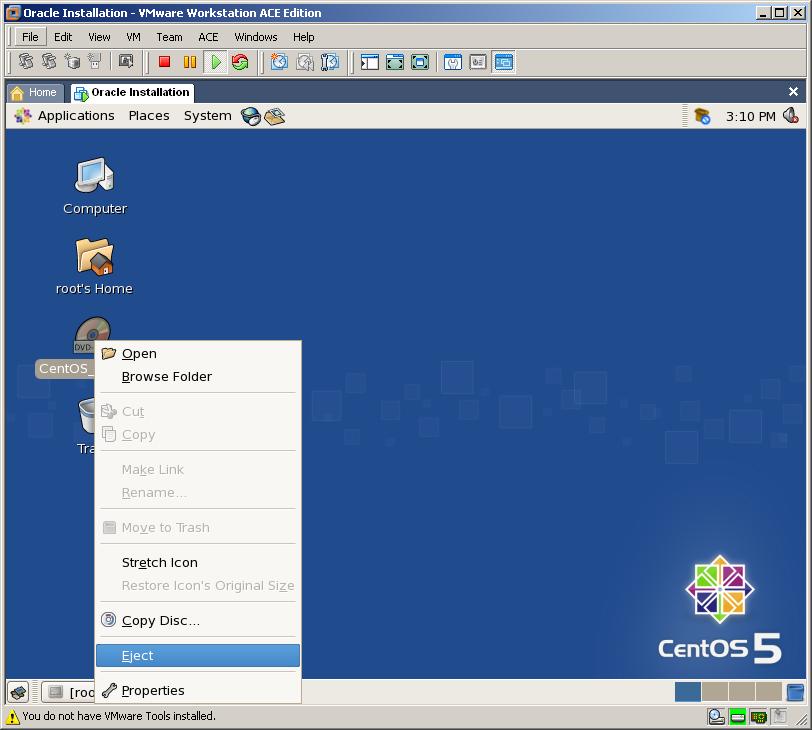
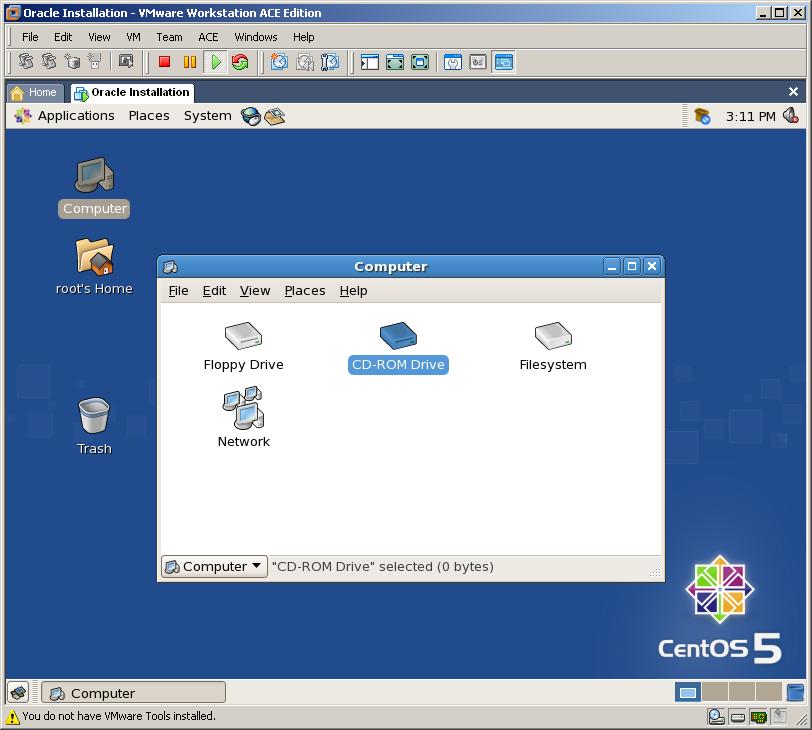
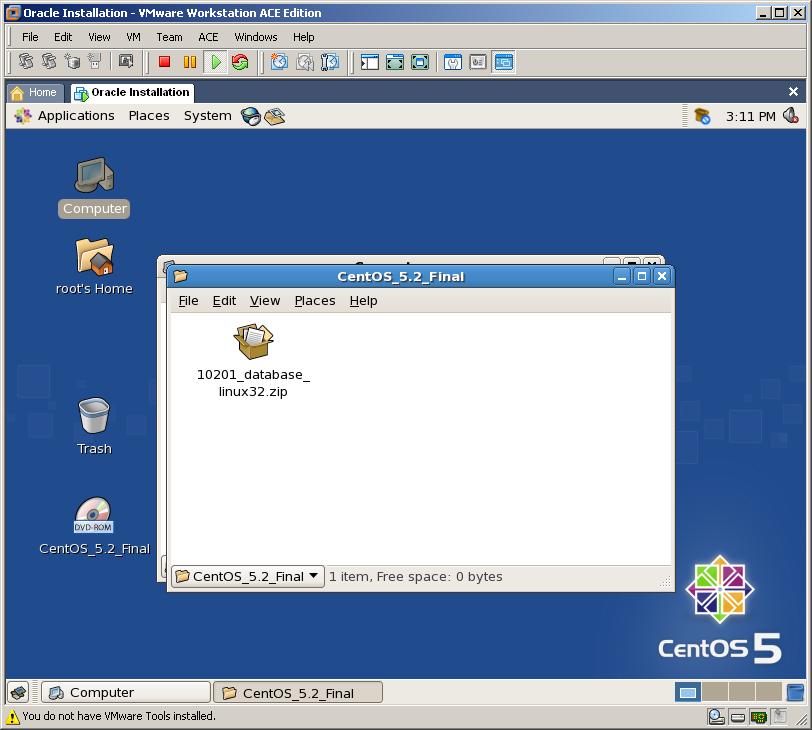
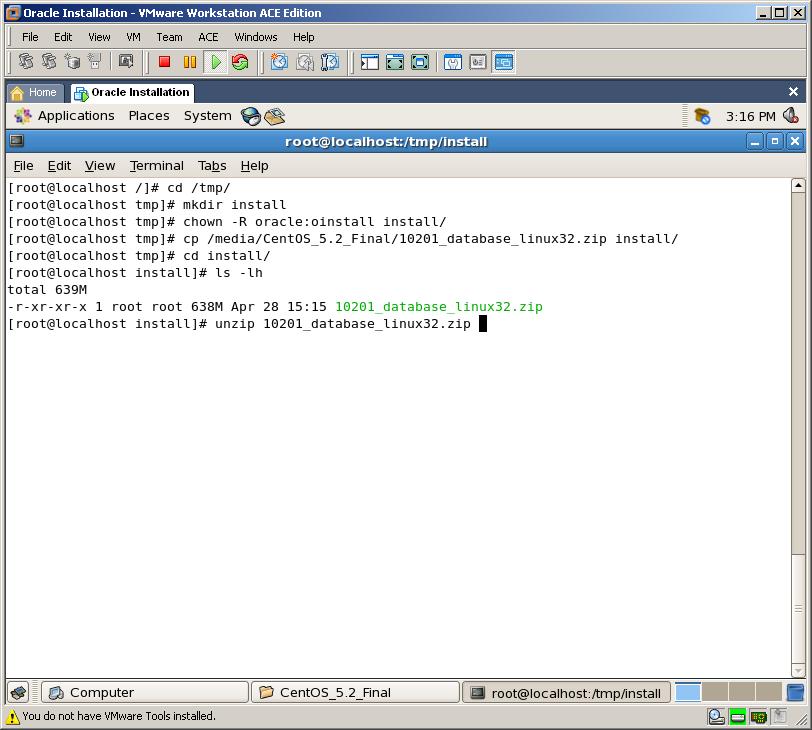
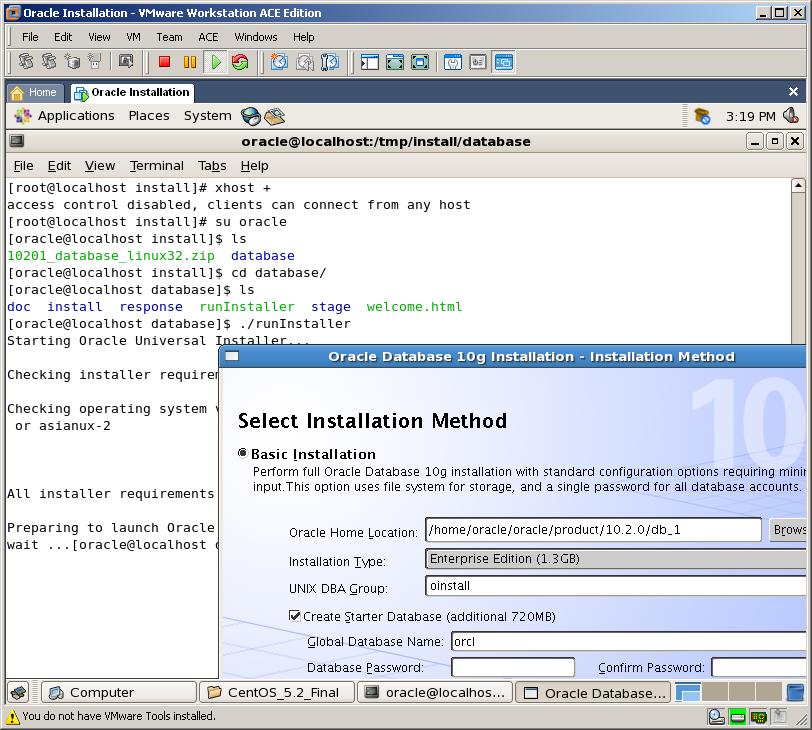
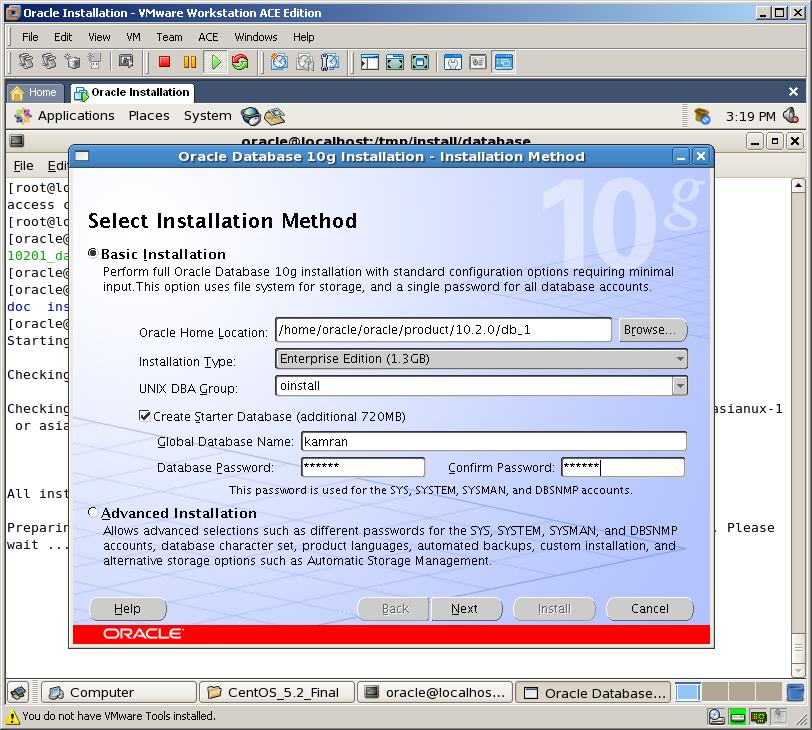
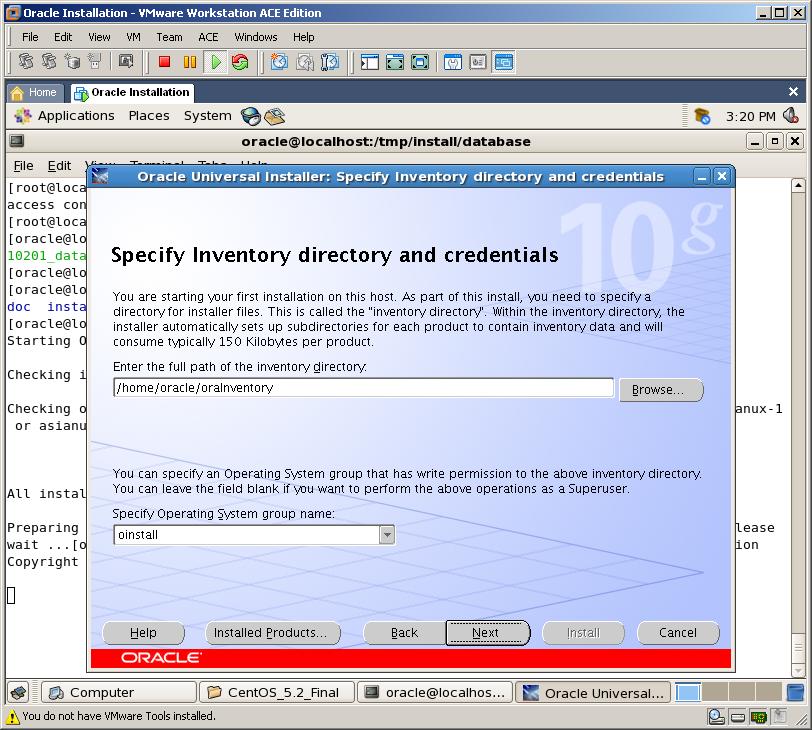
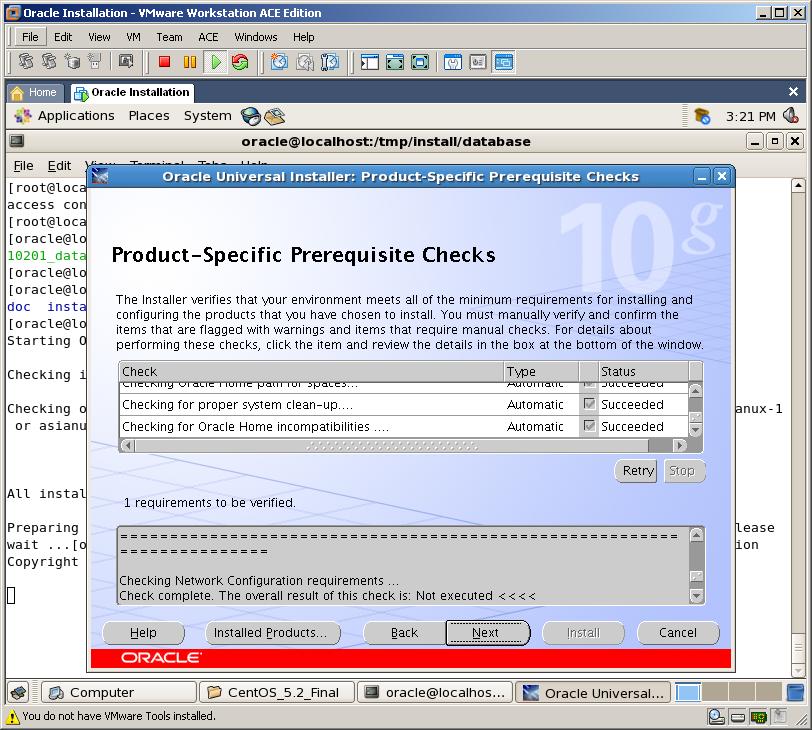
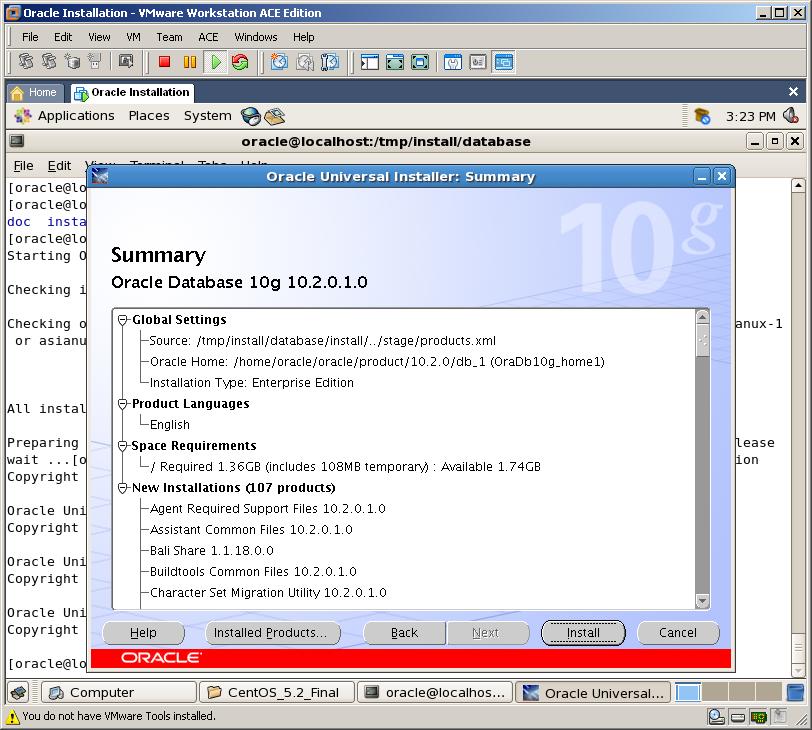
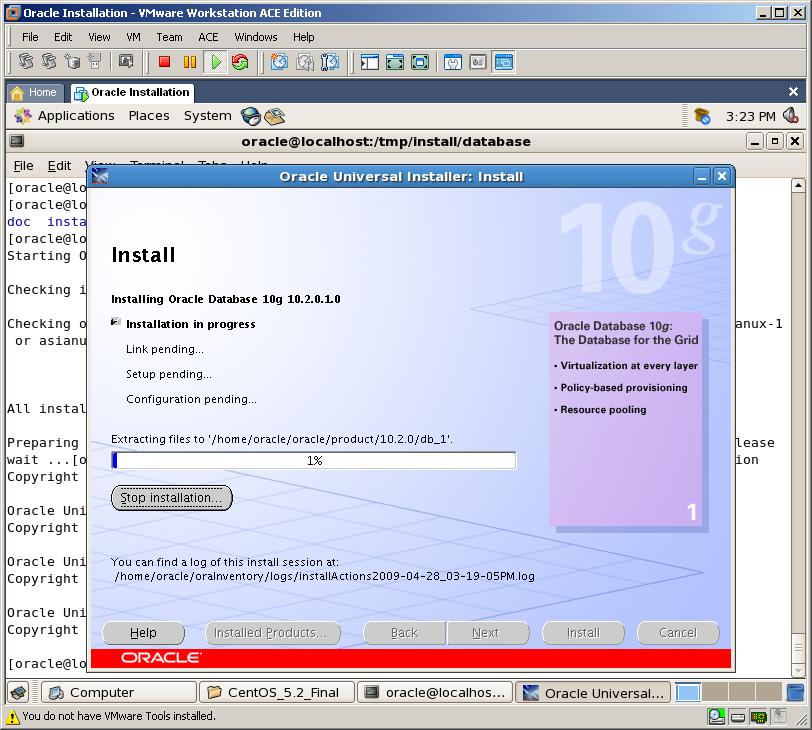
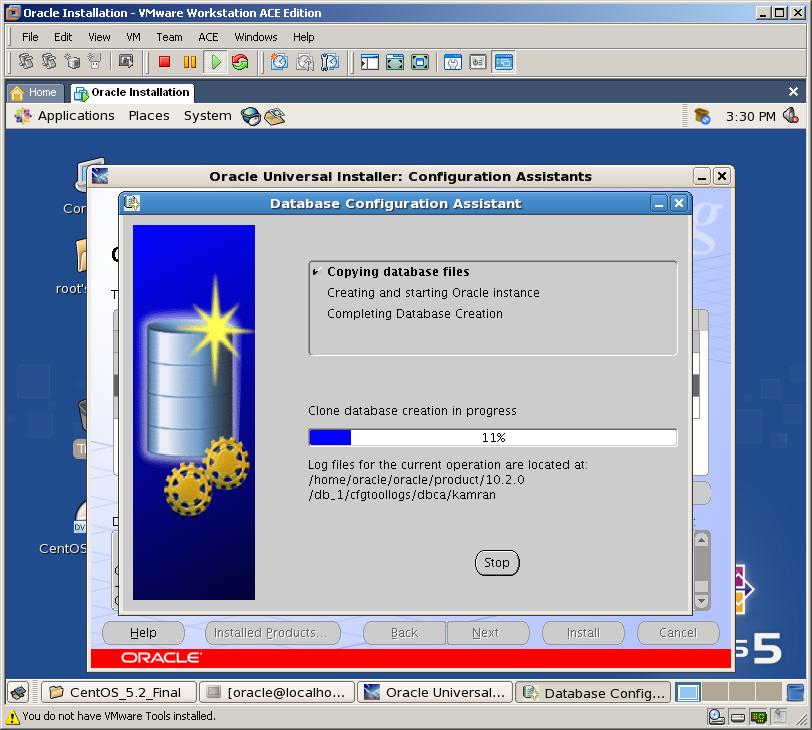
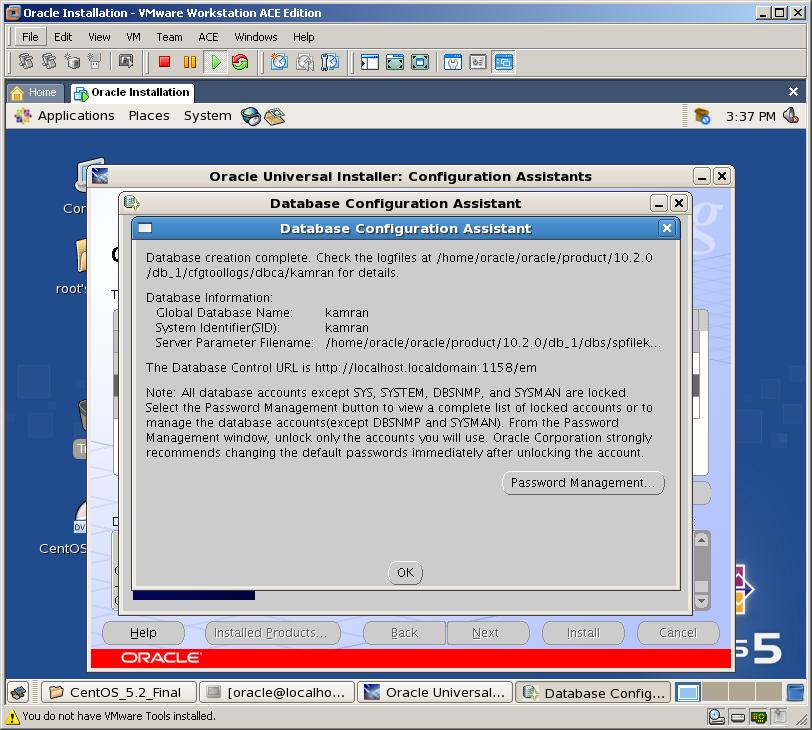
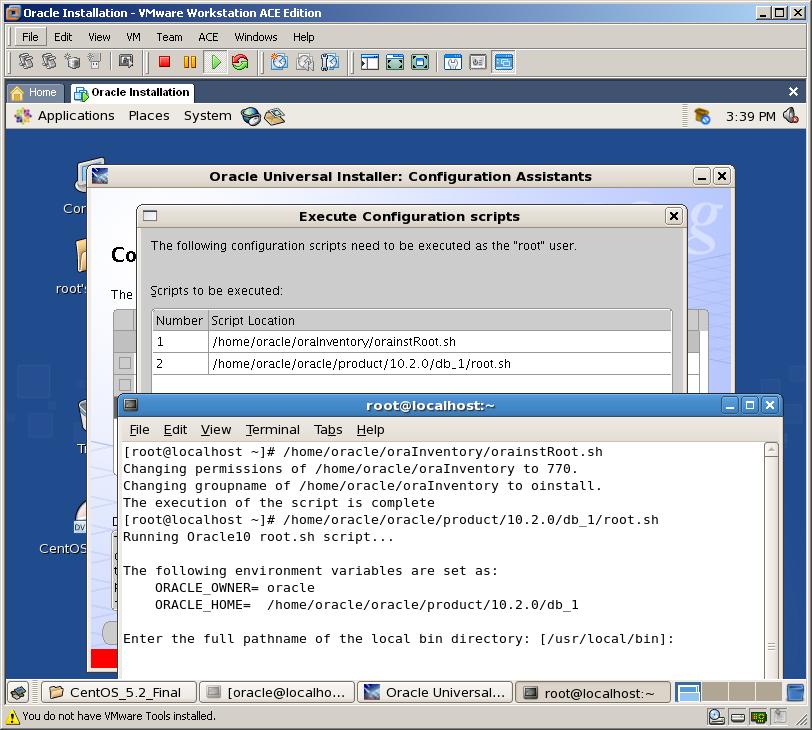
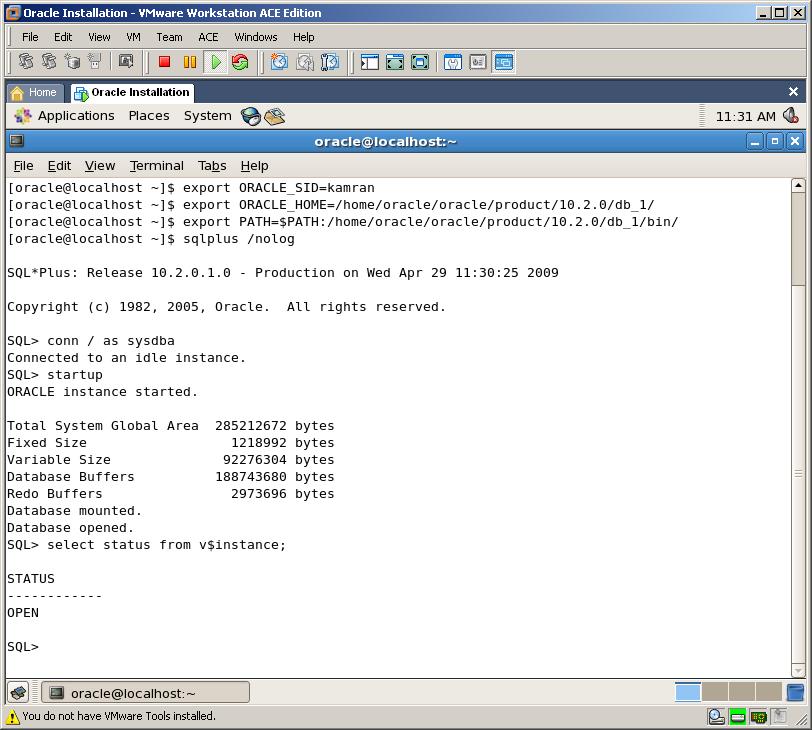
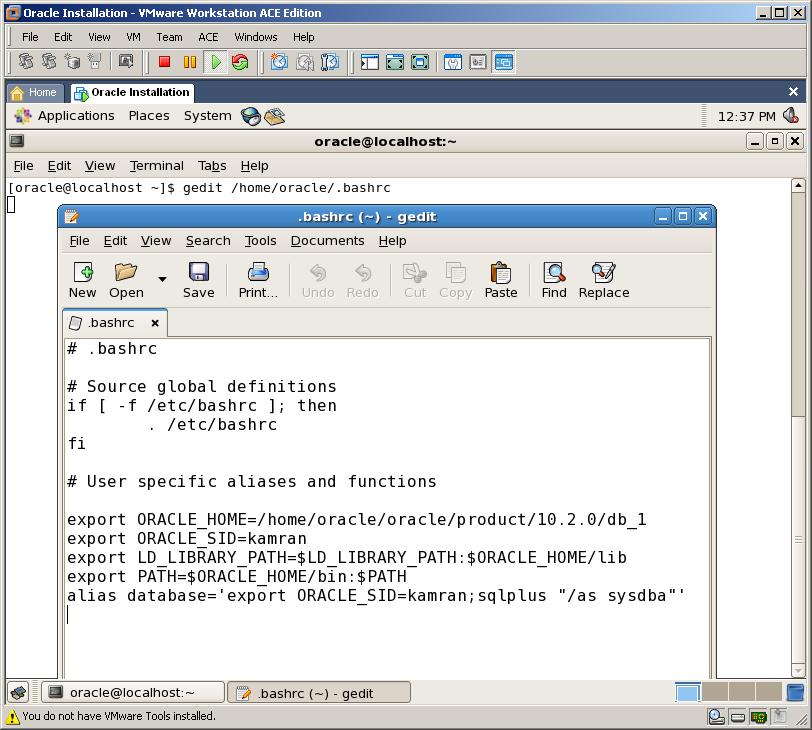
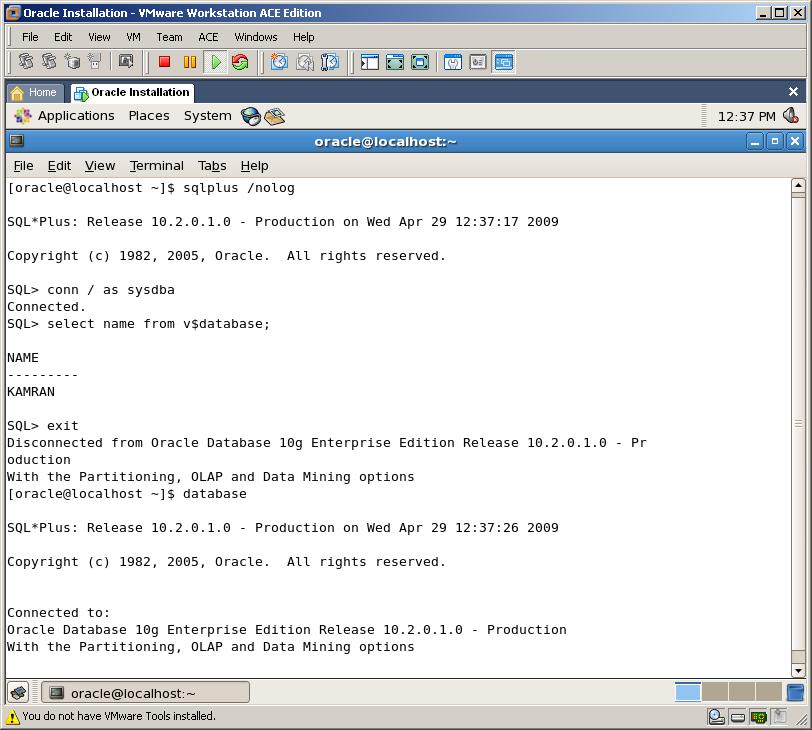
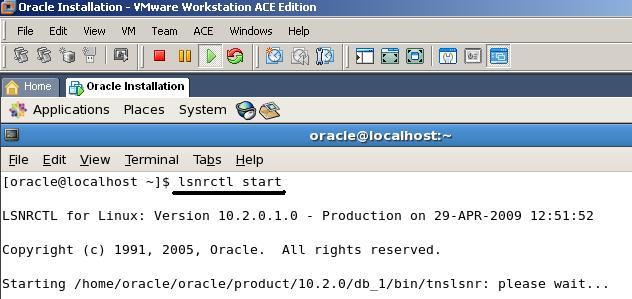
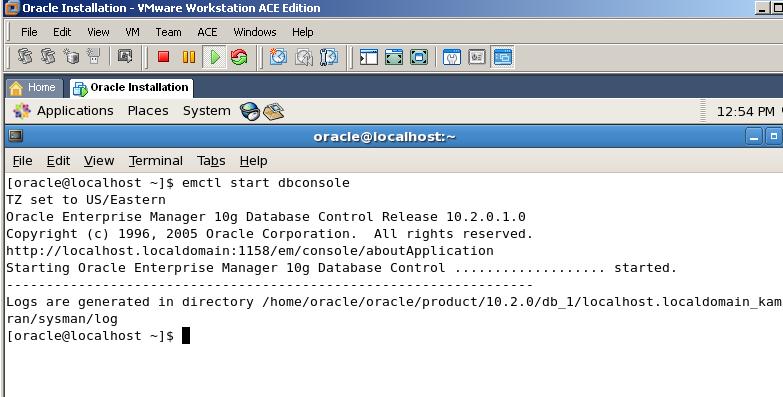
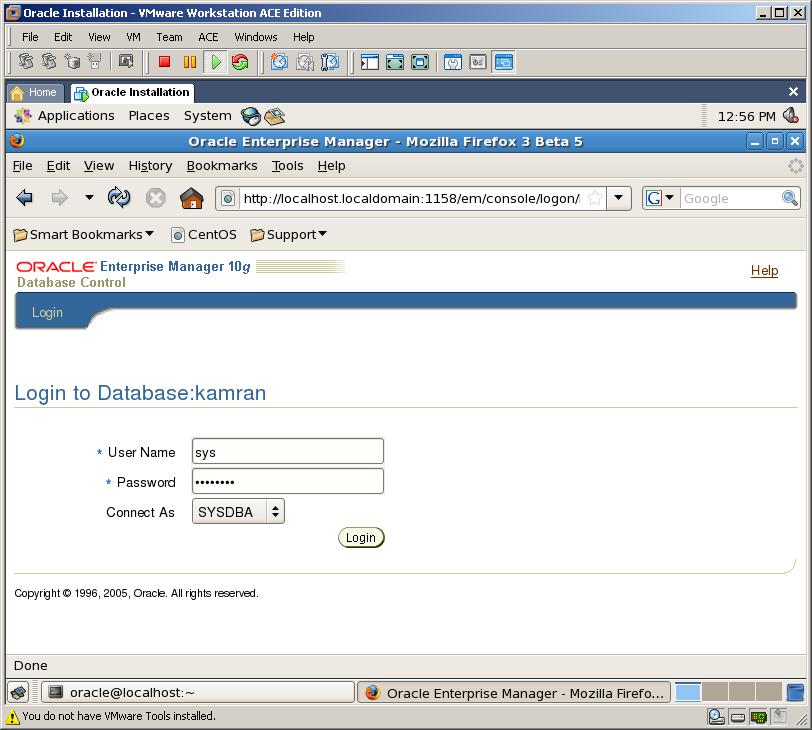
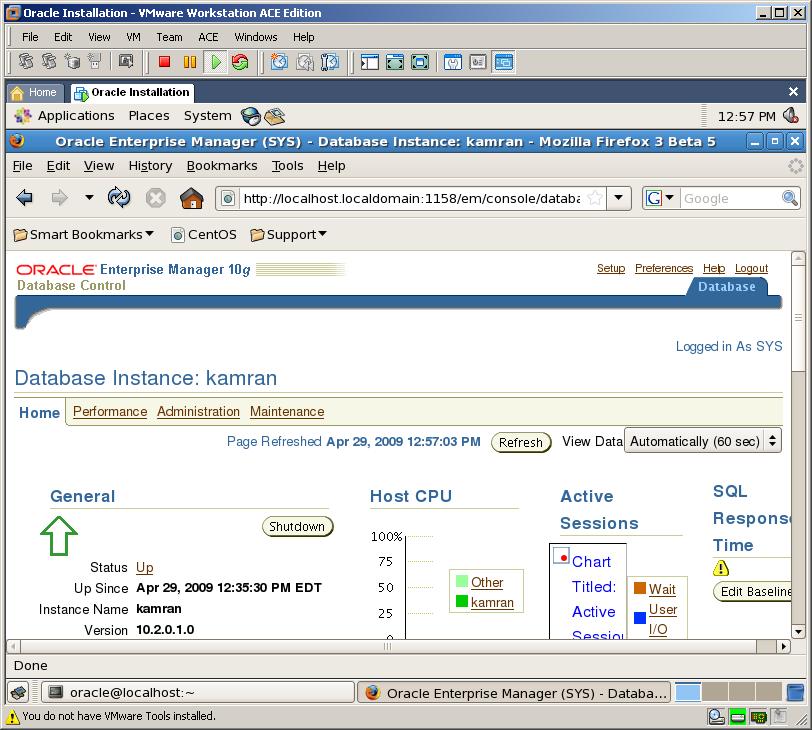
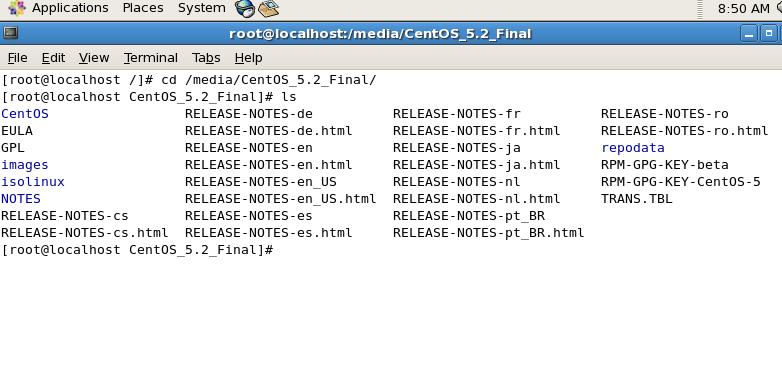
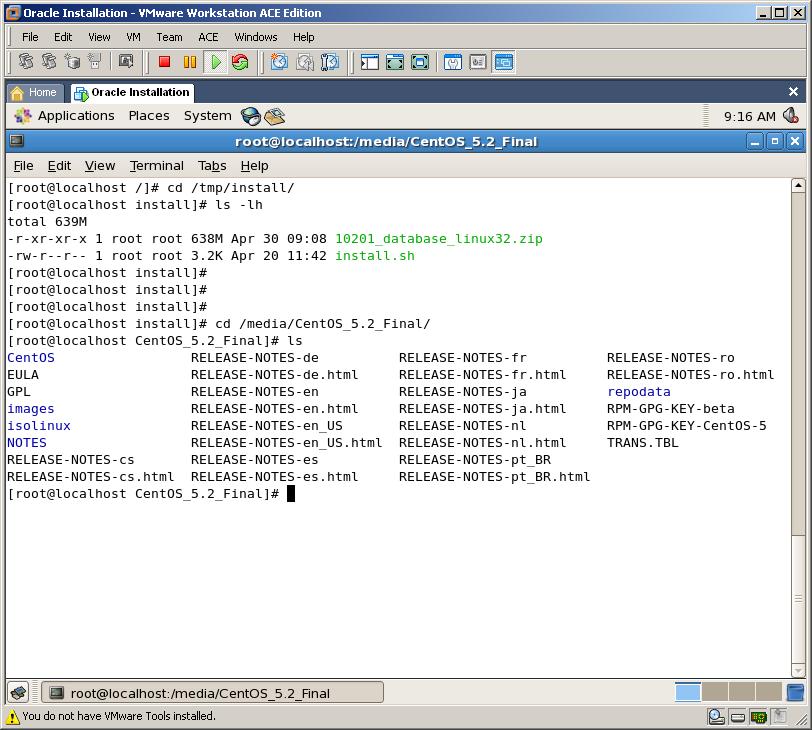
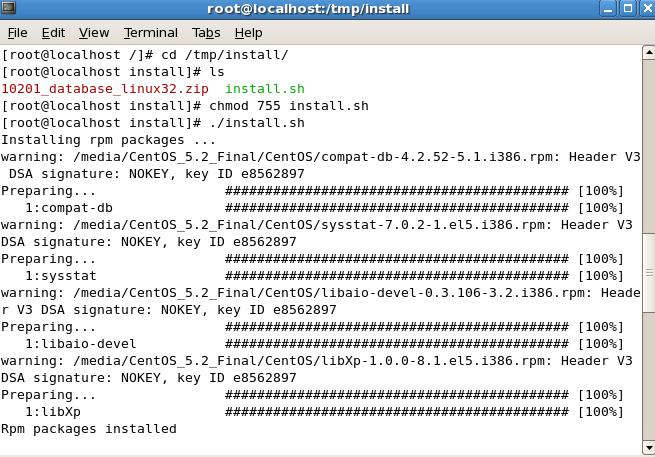
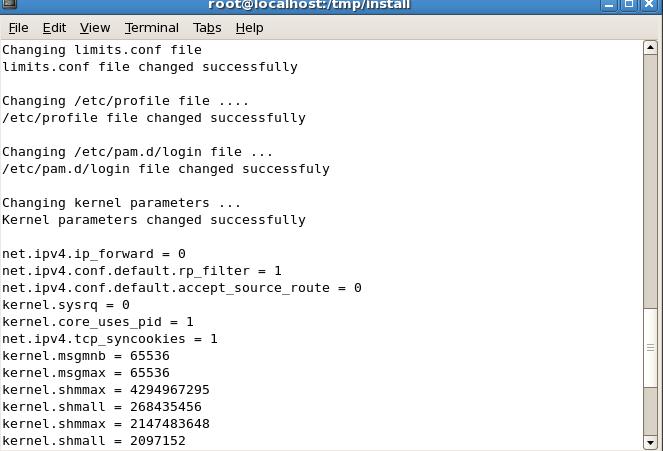
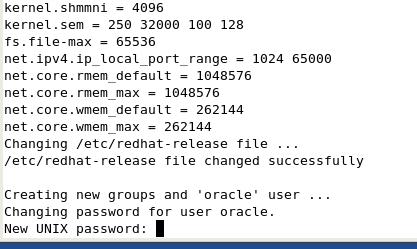
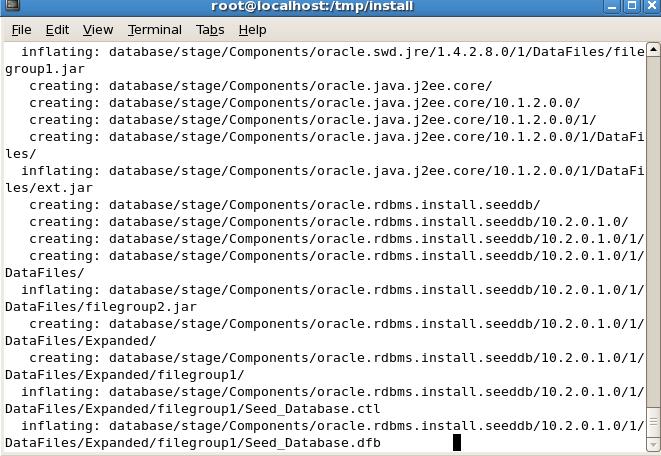
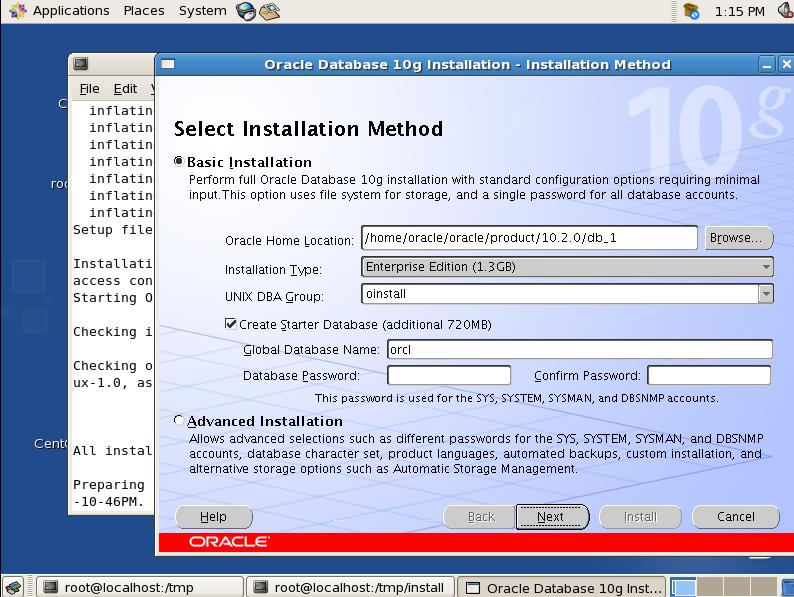
May 6th, 2009 at 10:47 am
VMware Server 2.0 ‘da,Oracle Enterprise Linux 5 update 4 üzerine Oracle 10g r2 kurarken son adımda database kurulumunda aşağıda bulunan linke koyduğum hatayı aldım;
http://www.resimbank.org/share-75A2_4A0121A7.html
bunun sebebi ne olabilir? çalışmalarınızın devamını dilerim,
şimdiden teşekkürler.
May 6th, 2009 at 12:58 pm
Merhaba tekrar,
compat-db-4.2.52-5.1.i386.rpm
sysstat-7.0.2-1.el5.i386.rpm
libaio-devel-0.3.106-3.2.i386.rpm
libXp-1.0.0-8.1.el5.i386.rpm
paketlerini Oracle Enterprise Linux 5 update 4 sistemine kurmadım,
bundan dolayı olabilir mi?
teşekkürler.
May 6th, 2009 at 2:56 pm
Merhaba Ahmet
Hataya bakdim. Amma gorunduyu gibi Oracle Software kurulmus, ama Oracle Database-in kurulumu ashamasinda Enterprise Manager-in configuration-inda hata almishsin. Error-da yazildiqi gibi installation-a devam edip Enterprise Manager-in konfigurasiyasini sonradan emca utility-si ile yapa bilirsin
Amma gosterdiyim 4 paketi kurma ZORUNDASIN. Belki onlar otomatik kurulmushdur (eger CentOS-u full olarak install etdiysen)
Onlari rpm -Uvh ile bir daha install etmeyi dene. Amma senin Oracle Datbase-in normal kurulmushdur bence. Database-e koshulup calisdiqina baka bilirmisin?
May 7th, 2009 at 7:05 pm
Hi Kamran,
What a good and detailed guide.
I have a question about the installation of Oracle 10g release2 on CENTOS. I have a Virtual server of CENTOS 5 and I am following the steps in your document.
However when I try to run the installer I get an error saying that it can’t connect to the X11 window server. Is there a step that I missed?
Thanks in advance.
Regards,
mariane
May 8th, 2009 at 9:17 am
Hi Mariane and welcome to my Blog.
You have to options:
1. By connecting root user, before installation of Oracle run
[root@localhost database]xhost +
[root@localhost database]./runInstaller
2. Additionaly, after creating oracle user, before installation you can logout from root user, login with oracle user and try installation. I think you’ll success
Good Luck
May 24th, 2009 at 2:10 pm
Hi Kumaran,
It’s really wonderful about the articles you plblished in your web site.
I have question like I was in SAP for some time not really many opp are coming I want to start my carrier as Oracle DBA on Unix – linux and I am hands on Unix and I have teaching exp as Oracle DBA long back 5 years ago about 1 year.
What do you suggest like should I continue my carrier as Oracle DBA or not ? If so On which flavour of unix do u suggest….I do agree that Linux is available on free some time.
Please advise me.
Thanks in Advance
Vijay
May 27th, 2009 at 11:59 am
Hi Vijay I’m from Azerbaijan, not from Pakistan
I’m from Azerbaijan, not from Pakistan 
Firstly I want to notice that, my name is Kamran, not Kumaran.
I strongly advice you to continue your career as Oracle DBA. It’s your choice. Start learning Oracle on Linux (RedHat, CentOS and etc.)
Do practices, read documentations. Being Oracle DBA/Developer is a very good choice for your career. Good luck
June 6th, 2009 at 8:16 pm
I really liked your blog!
June 10th, 2009 at 10:32 am
Hi Kamran,
Good post. Really helpful for all.
June 10th, 2009 at 10:35 am
Hi Shyam
Keep going. Test all that written above and practice them step by step. I assume that it will help you more
June 10th, 2009 at 10:45 am
Kamran,
afew days back, I installed oracle database 10.2 on mac os server 10.5.4.
I have some issues on that.
Did you installed oracle ever on mac os ??
June 10th, 2009 at 10:48 am
No I didn’t
But there’re some beautiful articles written about this. One of them is :
http://www.williamrobertson.net/documents/install-oracle10g-intelmac.html
June 10th, 2009 at 10:59 am
I gone through this article long back.
some more beautiful articles are also here. for your info
1. http://blog.rayapps.com/2009/04/12/how-to-install-oracle-database-10g-on-mac-os-x-intel/
2. http://www.pythian.com/news/1937/quick-install-guide-for-oracle-10g-release-2-on-mac-os-x-leopard-intel
3. http://www.nostalgix.org/blog/2005/05/install-oracle-10g-on-mac-os-x-104.html
Thanks.
June 10th, 2009 at 11:03 am
Thanks Shyam for information. It will be useful for visitors who interest in Installing Oracle on Mac
June 10th, 2009 at 1:20 pm
Hi Kamran,
Great tutorial! Thans a lot brother!
[bayu] – Indonesia
June 10th, 2009 at 2:48 pm
Hi Bayu
Welcome to my Blog! I’m happy to see you here
June 10th, 2009 at 3:57 pm
Kamran,
I installed oracle software 10.2 on mac os server first then create database using dbca. It went well but
I did not find HR user created by system by default.
Can you suggest what will be the possible reason??
June 10th, 2009 at 4:21 pm
I think you should install Sample Schemas
While creating database with dba, you should check the checkbox of “Create Sample Schemas”
If you didn’t check it, you can install it manually after creation of database
Please refer to documentation for how to install manually the Sample Schema
http://download.oracle.com/docs/cd/B19306_01/server.102/b14198/installation.htm#I6806
June 11th, 2009 at 9:23 am
But all other schemas are available excluding HR.
I will try to do it manually.
June 14th, 2009 at 4:04 am
Hi,
Just small corrections on 4th steps (groupadd) above, to remove -g option.
The script is already correct, without -g option.
[bayu]
June 22nd, 2009 at 12:54 pm
You’re right Bayu. We use -g option when we want to give numeric value for the group
Thanks for correction!
June 28th, 2009 at 4:03 am
Really good stuff
June 29th, 2009 at 9:06 am
Thanks Imran
June 30th, 2009 at 5:19 am
dear Kamran
i followed all steps in your blog, and done installing oracle on my computer with no error. but when i tried to open em(i already started the listener), there’s an alert said “The connection was refused when attempting to contact basdat.ittelkom.ac.id:1158”. i dont know, maybe the network parameter is incorrect(im using static IP address), but i just dont know how to fix it, since im stil new to RHEL environment.
i hope you can help.
thanks, and sorry for my bad emglish, its my secondary language 😀
nice blog btw
-aditt-
June 30th, 2009 at 4:46 pm
Hi Kamran,
But the command is still not corrected
It’s still:
groupadd -g oinstall
groupadd -g dba
June 30th, 2009 at 4:54 pm
Ups. I’ve forgotten Bayu. I’ve made that change. You can see
July 4th, 2009 at 8:23 am
Hi Kamaran,
Excellent document.
I am looking help on how to setup primary database and standby database.
how to sync and failover . pl advise.
regards
rezzu
July 4th, 2009 at 2:18 pm
Hi Rezzu
It is one of my plans to write a step by step article about it. But for now, I can only direct you to another well written document about “how create standby database”. Please refer to below link
http://blogs.oracle.com/alejandroVargas/gems/DataGuardPhysicalStandbystep.pdf
July 4th, 2009 at 2:23 pm
Hi Aditt
I’m very happy that you were able to install Oracle on Linux usint this article.
In order to solve your problem, you can refer to below links. There’re so many suggestions and topics which were discussed in forums
http://tinyurl.com/mhxbwc
July 5th, 2009 at 11:25 am
thx kamran
i will check it out, i will let u know if its work, and if its not, perhaps i will back here 😀
July 6th, 2009 at 8:53 am
Ok Aditt. Let me know the result
July 6th, 2009 at 2:59 pm
yay, thanks sir, the installation is done, and working 😀
i think last time i installed oracle, i forget to start dbconsloe, hehe, and also something with .bashrc file, i just dont understand, my bad.
so today i re-install the OS, rpm package, and then installing oracle, following steps in this blog, and also reading the manual, and voila, its work, although i’m still a a little bit confused with ORACLE_HOME, ORACLE_BASE, ORACLE_SID, export this, export that, etc, but its okay, oracle is working, and i can learn about those later hehe
thank GOD i found this blog
thanks a lot for writing this blog and replying my questions
regards
aditt
July 6th, 2009 at 4:56 pm
Hi Aditt

I’m very glad that this article was helpful
And DON’T be confused on exports. It’s very easy. You can have more than one database in your system. And each time you run sqlplus and connect to database, Oracle SHOULD KNOW which database to connect. Thus, you export ORACLE_SID and tell Oracle that now you want to connect to this database
For more information, you can refer to :
http://www.idevelopment.info/data/Oracle/DBA_tips/Unix/UNIX_4.shtml
http://ugweb.cs.ualberta.ca/~c391/manual/chapt3.html
Additonaly, now I’m working on Video Tutorial on “Oracle Installation”. For my first Video Tutorial, you can refer below link:
http://kamranagayev.wordpress.com/2009/07/04/using-rlwrap-to-get-command-lines-history-in-sqlplus-video-tutorial/
Good Luck!
July 7th, 2009 at 5:38 am
o0o0ow, i see now.
another help from you
thanks again for the explanation, and for the link too.
and the video, that’s a great idea, i wonder if i can download it, so i can watch it offline hehe
July 7th, 2009 at 8:59 am
You’re welcome Aditt
July 24th, 2009 at 11:59 am
Hi Kamran,
I have oracle database 10.2 running on mac server 10.5.7.
Now a days, when I start database manually it took more time to start. However there is not huge data in my database stored.
Can you tell what is the possible reason of delay to start.
Thanks.
–Shyam
August 8th, 2009 at 5:30 am
Hola Kamran Agayev, solo quiero decir que la guia es EXCELENTE. Muy buena.
¿Como puedo definir un ORACLE_SID? No me funciono el EM, porque no tengo definido el SID.
Gracias
August 10th, 2009 at 9:13 am
Hi Alejandro and thank you for your comment. Although it’s written in Spanish, I was able to translate it using google
You wrote:
I just want to say that the guide is excellent. Very good
How can one define ORACLE_SID? I do not run the MS, because I do not set the SID.
My Answer:
If you use Windows, then use set ORACLE_SID=your_sid
If you use Linux, then use export ORACLE_SID=your_sid
That’s all. Now, let me translate it to Spanish
Si utiliza Windows, y luego use conjunto ORACLE_SID = your_sid
Si usas Linux, a continuación, utilice la exportación ORACLE_SID = your_sid
August 10th, 2009 at 2:59 pm
Thanks men it is really help full for me .. Once again thanks a lot ..
August 10th, 2009 at 6:26 pm
Hi Naveed. You’re welcome!
September 15th, 2009 at 7:38 pm
Hi Kamran,
It’s really wonderful about the articles you published.
It’s really help me to understand how to install oracle on linux.
Its an Excellent document.
I am desperately searching for this type of document.
I followed all the steps which you mention in the blog.
I successfully installed the Oracle 10g on Linux.
But I got one error after restarting my Laptop.
When i try to connect to database url http://localhost.localdomain:1158/em
i am getting following error:-
ORA-12505 TNS:listener does not currently know of SID given in current description.
Please help me to resolve this error
Waiting for your reply.
September 15th, 2009 at 9:27 pm
sir,
i want to install oracle 10g to learn oracle 10g dba please tell me which server/software i have to install.can i use same server for oracle 10g developer for sql/plsql,please give me detail of computer configuration for installation
September 16th, 2009 at 9:03 am
Hi Prageet. I’m so happy that this article helped you somehow
According to error you get, you need to shutdown the database, shutdown the listener and Enterprise manager. Then open the database, listener and Enterprise Manager in these steps. You should open Database firstly, then listener and then EM. Doing that way, you’ll be able to start Enterprise Manager without getting any error.
Good Luck
September 16th, 2009 at 9:11 am
Hi Hema
If you want to install Oracle, you can use Oracle for Windows, it’s very easy. By clicking some “Next” buttons you’ll succesfully install Oracle on Linux
If you want to install Oracle on Linux, you need to download CentOS (it’s free) and using this blog post try to install Oracle on Linux
Good Luck
September 16th, 2009 at 10:48 am
Thanks Sir for the reply,
But i am not able to shutdown the database.I am not able to login in SQLPLUS with SYSDBA.
Please help me.
And i have a small query sir.
I want to create another database on same host.It can be done with dbca command.But how can i configure it to run on linux??
And also how can verify the number of database running on host with sql query??
Please help me sir.
Waiting for your reply.
September 16th, 2009 at 10:52 am
Hi Prageet
Try to connect to the database as follows:
[oracle@localhost ]sqlplus “/ as sysdba”
But before connection, make sure you’ve set environment variables such as ORACLE_HOME, ORACLE_SID and PATH
If you want to create another db on the same machine, firstly you need to set PATH variable to $ORACLE_HOME/bin and run dbca command (Database Configuration Assistant) to create new database
To verify number of databases running on the host use:
[oracle@locahost] ps -aux | grep pmon
There, you’ll find the name of each instance running on your host
You can post your questions on http://forums.oracle.com under Database-General topic to get more brief answers from other DBAs
Good Luck
September 16th, 2009 at 10:48 pm
Once again thank you very much sir for your prompt reply.
It resolve my problem.
But when i create another database on same machine & after creation i restart the laptop & start listener & dbconsole but after this i am not able to login in Enterprise Manager whose url is:
http://localhost.localdoamin:5500/em.
When i start dbconsole it start only my first database url:-http://localhost.localdomain:1158/em
I am able to connect my first database.But when i try to connect my second database it show me error:-
error:-“CANNOT ESTABLISH THE CONNECTION WITH LOCALHOST.LOCALDOMAIN”
I donot understand what is the problem.
Please help me.
September 17th, 2009 at 6:27 am
Great Great Article, Good Job. I was able to install oracle on Linux (CentOS 5.2) and got it off the ground with the help of Kamran’s Step by Step Guide.
September 17th, 2009 at 3:24 pm
Hi Prageet
I’d suggest you to post your question to OTN forum please. Don’t worry, I’m there
September 17th, 2009 at 3:26 pm
Hi Ghost Ryder. I’m so happy that my article was useful. Go on learning Oracle
September 17th, 2009 at 6:42 pm
Ok sir i will do that…….
But i want to thank you once again for this wonderful article & also your help.
September 17th, 2009 at 6:43 pm
Hi Prageet
You’re welcome. I’ll try to add more Step by Step explanation guides to help beginners to learn Oracle easily
September 22nd, 2009 at 2:03 pm
[…] Step-by-step Installing Oracle Database 10g Release 2 on Linux (CentOS) […]
October 5th, 2009 at 6:54 pm
Hi
I have install Oracle 9i on Redhat Linux 4.
I am not able to user isqlplus through mozilla.
Is there configuration needs to be done.
I have checked all the services like http,listner etc.
Please help me I am not getting solution..
October 11th, 2009 at 7:31 pm
Hi Tnks for sharing your experience can yo help my about step by step install physical standby white rman?
October 12th, 2009 at 8:57 am
Hi Mostafa. Unfortunately I haven’t created step by step instruction on how to create standby database using RMAN yet. As you know I’m currently working on my RMAN book and there’s a one seperate chapter for “Creating physical standby database using RMAN”
However, there’re a lot of examples over net which you can find by google-ing. Moreover, I’d suggest you to refer to documentation
http://download.oracle.com/docs/cd/B19306_01/server.102/b14239/rcmbackp.htm#i636377
Good Luck
October 20th, 2009 at 7:17 am
Hi KAMAL, once you started your oracle, in your shell type:
[oracle@localhost ~]$ isqlplusctl start
iSQL*Plus 10.2.0.1.0
Copyright (c) 2003, 2005, Oracle. All rights reserved.
Starting iSQL*Plus …
iSQL*Plus started.
[oracle@localhost ~]$
With that you can connect to the server throw web browser:
http://localhost:5560/isqplus
sorry for my english.
October 20th, 2009 at 5:10 pm
Hi,
Nice article with lot of knowledge. Thanks a lot.
October 23rd, 2009 at 1:05 pm
You probably would like to read the following http://diznix.com/2009/10/21/problems-with-xen-and-goal/ especially regarding the prerequisites pam_limits.so
Nicolas.
November 13th, 2009 at 1:09 pm
hi . how are u? thanks for learn. im from iran
im 25 years old. i use to sql server 2005 and i want to study oracle dbms, how can i study oracle. please help me , thanks,
December 9th, 2009 at 10:04 am
Hi homonloo
I’d suggest you to start reading Oracle Documentation from http://tahiti.oracle.com (Especially 2 Days Administration docs)
Start reading documentation, Install Oracle and do more practices. Moreover, I’d suggest you to read any OCA preparation books, because they have lot of examples and practices than documentation
Good Luck
December 3rd, 2009 at 3:39 pm
Salam!zehmet deyilse mene komek ede bilersiz.men linuxa teze baslayiram bele 1 problemle uzlesmisem.oracle install etmek ucun gosterdiyiniz emrleri etdim bu sehvi verdi.mumkunse komek ederdizde.cox sagolun!
There were errors encountered in trying to update the software you selected.
file /usr/share/man/man1/Xserver.1x.gz from
install of xorg-x11-server-Xvfb-1.1.1-48.67.el5.i386 conflicts with file from package xorg-x11-server-Xnest-1.1.1-48.52.el5.i386
file /usr/share/man/man1/Xserver.1x.gz from install of xorg-x11-server-Xvfb-1.1.1-48.67.el5.i386 conflicts with file from package xorg-x11-server-Xorg-1.1.1-48.52.el5.i386
December 9th, 2009 at 10:02 am
Salam Huseyn
Bu xetani hansi seviyyede almisan?
Hansi linuxu istifade edirsen?
Yazdiqlarimi addim addim izlemisense, bu xetani almamalisan, teklif ederdim bir daha addimlari izleyib Oracle Installation-i yoxlayasan
Uqurlar
December 8th, 2009 at 10:53 pm
I just came across your site and am very delighted! I want to be part of your discussion group!
You’ve done and are doing a great job!
Keep up man!
I noted that you did not address the network aspect in the during the above installation of Oracle. I know you mention during the creation of VMware machone you use a bridged network. Is it enough for the Oracle installation?
Thank you!
December 9th, 2009 at 10:01 am
Hi pouctam
As we use VMware for testing purpose, it’s enough to use bridged network, although we have different options
December 8th, 2009 at 11:47 pm
hey thanks it really helped me a lot to start my oracle
i am preparing for OCP and oracle on linux certification.
with this tutorial i am able to con to oracle database on linux
otherwise i have to do oracle on windows
Thanks once again,
Atif Iqbal
(Bakuryu)
December 9th, 2009 at 9:59 am
Hi Atif Iqbal. I’m so happy that this article has helped you
December 9th, 2009 at 11:39 am
your guide is the great among all the guides I searched in Google, THANKS
I have one inquery, If I install CentOS 5.4 64 bit version & Oracle 10g for Linux 64 bit, is this the same ?
I guess it’s same except they need different set of prerequisite .rpm, if it’s so, what are they ?
thanks
Thang
December 9th, 2009 at 11:55 am
Hi Thankg
Thank you for your comment. Yes, you’re right. You need to install additional rpms, but all the steps are same
December 9th, 2009 at 12:13 pm
hey kamran
I want to tell you that I was installing oracle on linux since 10 days but by reading your tutorial I installed and configured the oracle settings within 10 mins.
So you might be knowing how HAPPY I might be.
Now I want to know how to set editor for oracle so as to use ed cmd
I tried
export VIEWER=vi;
but this dint work please do tell me how to set editor..
December 9th, 2009 at 1:12 pm
Hi Atif. I’m so happy that my article has helped you somehow
Use the following command:
export EDITOR=vi
December 9th, 2009 at 1:02 pm
I am very happy beeng a student of Kamran Agayev……!
December 9th, 2009 at 1:10 pm
Thank you Imran for your kind words. I’m also happy having students like you
December 9th, 2009 at 1:23 pm
export EDITOR=vi works in my classes but it dint work on my pc
i tried
define_editor = vi
on sql prompt and it worked
thanks for reply
December 9th, 2009 at 7:26 pm
Kamram,
what are the specific prerequisites .rpm for Oracle 10g 64 bit on CentOS 5.4 64 bit ?
appreciate your help to list it here, so I will try it tomorrow
thanks
Thang
December 9th, 2009 at 7:31 pm
See the following link
http://download.oracle.com/docs/cd/B19306_01/install.102/b15667/pre_install.htm#CIHFICFD
December 9th, 2009 at 8:23 pm
Hi
I just look at this link but it doesn’t relate to 64bit platform specifically, could you please explain why !?
December 9th, 2009 at 8:26 pm
oh Sorry, I found it at the top of the page
Oracle® Database Installation Guide
10g Release 2 (10.2) for Linux x86-64
thanks
December 10th, 2009 at 5:52 pm
@Thang 😉
Good Luck
January 19th, 2010 at 4:15 pm
Hi Kamran,
I was looking for guides to install Oracle 11gR2 EE (plus OBIEE later) on CentOS 5.4,
it was really difficult to find some useful documentations..finally I found your guides..they seem to be very clear,
guess I can use them also for the new versions, CentOS 5.4 + ORA 11gR2…???
Have still a question regarding the selected packages, you say:
‘To install packages, especially for working with Oracle Server, select all options except Clustering and Storage Clustering. Then select Customize now option and click Next’ +
‘Then, from Base System menu, select Legacy Software Support, System Tools and click Next ‘
to we really need them all?
Thanks a lot
Zeynel
January 29th, 2010 at 7:56 pm
Dear Zeynal. Sure not. But in case of selecting each rpm package inside the list and for quick installation, I suggest to select them all. However, you only need those packages that are required for Oracle (they’re written in the installation guide of each OS)
February 21st, 2010 at 5:45 pm
Thanks for the info Kamran,
finally I could manage to complete the installation;
(CentOS 5.4 + ORA 11gR2) some modificiations were needed,
also ORA-WarehouseBuilder is activated, and it’s running well,
next step is ORA-BI
February 26th, 2010 at 3:49 pm
Congratulations Zeynel!
March 17th, 2010 at 5:03 pm
Dear Kamran,
Its an excellent document. I like your blog. I will stay in contact with you.
March 18th, 2010 at 9:35 am
Dear Muhammad
You’re welcome and thank you for your comment.
March 18th, 2010 at 5:52 pm
I am total novice to CentOS as well as oracle. Just by following the steps mentioned here, I was able to successfully install the oracle. Thanks a lot and keep up the good work. Thanks again.
Ajay
March 18th, 2010 at 7:48 pm
Dear Ajar
Welcome to my blog and thank you for your comment. I’m so happy for you
Good Luck!
March 22nd, 2010 at 12:16 am
Hi sir,
Actually I am doing My academic project so I need to Automate the VM installation and creation of VM and also load mysql on that VM and test the query using Mysql benchmark sysbench.
can you give some instruction to Automate the above process?
Thanks in advance.
March 26th, 2010 at 3:48 pm
Merhaba Kamran
Redhat EL5 ve Oracle 10g kurulu makinada rman ile ibm tsm üzerinden tape e bakup almak istiyorum.
yol gösterebilirmisin
şimdiden teşekkür
April 7th, 2010 at 9:56 am
Merhaba Akin
Bu konuda genis bilgini asaqidaki blog post-dan ala bilirsin
http://bigdaveroberts.wordpress.com/2007/04/26/installing-and-supporting-oracle-rman-and-tivoli-dpo/
March 26th, 2010 at 10:32 pm
Kamran,
You have done a great job with this tutorial. I have found it incredibly useful in my installation on CentOS 5.4. I have been working through some basic issues, such as a connection refusal when trying to launch the Enterprise Manager Console. I was getting the following error message in the emoms.log file
WARN jdbc.ConnectionCache _getConnection.306 – Io exception: Then Network Adapter could not establish the connection.
I checked to make sure that I have my firewall and virus control off. I am thinking that the issue may revolve around the connection method. I will review the information that you provided on DHCP connections as this is currently my set up. Any thoughts?
Best,
Brandon
March 27th, 2010 at 12:18 am
Dear Brandon. Thank you for your comment
Please make sure you’ve started the listener and then EM consequently
emctl stop dbconsole
lsnrctl start
emctl start dbconsole
March 27th, 2010 at 12:38 am
Can you give some instruction to Automate the VM machine ? like power on machine. after power on I want to launch the window that already power on.I did the power on process using the VIX api and Still I am struggling with launch the VM machine window. can u give some instruction how to do that?
March 27th, 2010 at 12:44 am
Dear Jamsheer
Unfortunately I’m not VMware professional so can’t help you on this
March 27th, 2010 at 12:53 am
thank you. Why I send you this because I saw your post like step by step to install the VMware.so I thought like that you can help me.its ok. can you give some instruction that how to automate Mysql server installation using shell script in linux?
April 17th, 2010 at 1:46 pm
This is a very very helpful post. I am installing Oracle 10g R2 on Centos 5. I followed all the steps but when I write ./runInstaller I get following error. Kamran I would be really thankful if you please help me in getting rid of this error.
[omer@server255 database]$ ./runInstaller
*** glibc detected *** /home/omer/Desktop/database/install/.oui: free(): invalid next size (normal): 0x080768d8 ***
======= Backtrace: =========
/lib/libc.so.6[0xb7efc595]
/lib/libc.so.6(cfree+0x59)[0xb7efc9d9]
/lib/libc.so.6[0xb7eeb660]
/lib/libc.so.6(fopen+0x2c)[0xb7eeb69c]
/home/omer/Desktop/database/install/.oui[0x8059016]
/home/omer/Desktop/database/install/.oui[0x804d57e]
/home/omer/Desktop/database/install/.oui[0x8050768]
/lib/libc.so.6(__libc_start_main+0xdc)[0xb7ea8e9c]
/home/omer/Desktop/database/install/.oui(wait+0x41)[0x8049405]
======= Memory map: ========
08048000-0805c000 r-xp 00000000 08:08 34439366 /home/omer/Desktop/database/install/.oui
0805c000-0805d000 rwxp 00014000 08:08 34439366 /home/omer/Desktop/database/install/.oui
0805d000-0807f000 rwxp 0805d000 00:00 0 [heap]
4e832000-4e83d000 r-xp 00000000 08:05 262372 /lib/libgcc_s-4.1.2-20080825.so.1
4e83d000-4e83e000 rwxp 0000a000 08:05 262372 /lib/libgcc_s-4.1.2-20080825.so.1
b7c92000-b7e92000 r-xp 00000000 08:03 1837969 /usr/lib/locale/locale-archive
b7e92000-b7e93000 rwxp b7e92000 00:00 0
b7e93000-b7fd2000 r-xp 00000000 08:05 262166 /lib/libc-2.5.so
b7fd2000-b7fd3000 —p 0013f000 08:05 262166 /lib/libc-2.5.so
b7fd3000-b7fd5000 r-xp 0013f000 08:05 262166 /lib/libc-2.5.so
b7fd5000-b7fd6000 rwxp 00141000 08:05 262166 /lib/libc-2.5.so
b7fd6000-b7fd9000 rwxp b7fd6000 00:00 0
b7fd9000-b7fed000 r-xp 00000000 08:05 262190 /lib/libpthread-2.5.so
b7fed000-b7fee000 r-xp 00013000 08:05 262190 /lib/libpthread-2.5.so
b7fee000-b7fef000 rwxp 00014000 08:05 262190 /lib/libpthread-2.5.so
b7fef000-b7ff2000 rwxp b7fef000 00:00 0
b8000000-b8001000 r-xp b8000000 00:00 0 [vdso]
b8001000-b801b000 r-xp 00000000 08:05 262159 /lib/ld-2.5.so
b801b000-b801c000 r-xp 00019000 08:05 262159 /lib/ld-2.5.so
b801c000-b801d000 rwxp 0001a000 08:05 262159 /lib/ld-2.5.so
bfa0f000-bfa24000 rwxp bffeb000 00:00 0 [stack]
./runInstaller: line 47: 18154 Aborted $CMDDIR/install/.oui -oneclick
[omer@server255 database]$
April 19th, 2010 at 4:51 pm
Dear Habib
See the following link
http://kevinclosson.wordpress.com/2007/04/18/dont-install-oracle-on-linux-servers-with-long-kernel-names/
April 20th, 2010 at 11:27 pm
hi Kamran,
Can you post some articles on how to do patching and upgrading from a version to another version.
i have some doubts about the upgrade.
Br
Chandu
April 21st, 2010 at 8:48 am
Currently I’m working on the installation of Oracle 10g on OEL. I’ve noted your suggestion and try to work on it
April 20th, 2010 at 11:28 pm
Thanks for the wonderful articles, i liked the Rman series a lot.
with the recovery scenarios.
Br
Chandu
May 10th, 2010 at 1:18 am
hi Kamran,
i have successfuly install oracle on my ubantu machine but when i am writing sqlplus on console it’s showing sqlplus: command not found…….plz help me connect oracle
May 10th, 2010 at 12:27 pm
Hi Prashant
You need to set Environment variables PATH, ORACLE_HOME and ORACLE_SID
Look at my step by step guide. I have done it in .bashrc file
May 10th, 2010 at 8:09 pm
Hey Prashant,
You Need to set ORACLE_HOME and PATH env variables,
First set ORACLE_HOME and then
set PATH=$ORACLE_HOME/bin:$PATH
To know your ORACLE_HOME view the inventory.xml file in your ContentsXML directory.
May 21st, 2010 at 7:09 am
Thank you so much, Kamran.
This xhost + command under root user saved my day!
cd /tmp/install/database
chmod 755 runInstaller
chmod 755 install/.oui
chmod 755 install/unzip
xhost +
sudo -u oracle /tmp/install/database/runInstaller
Vladimir
May 26th, 2010 at 4:42 pm
Thanks for help,
This guide is really nice .. It is usable for oracle 10 g installation on linux platform and centos linux
June 16th, 2010 at 9:39 am
I found some error with my installation oracle 10g on centOS 5.4, when 62% install oracle : Error in invokin target ‘ntcontab.o’ makefile ‘/home/oracle/oracle/product/10.2.0/db_4/network/lib/ins_net_client.mk’ See ‘/home/oracle/oraInventory/logs/installActions2010-06-16_07-19-27PM.log’ for details. Click ‘Help’, Retry’,’Ignore’,’Cancel’.
How problem solve with my installation, thank’s for your attention.
Best regards
A. Mulyana
June 17th, 2010 at 9:12 am
Dear Mulyana
Try to reinstall gcc and install Oracle Software again
June 17th, 2010 at 3:40 pm
ok, thank’s mr. Kamran… i will try again.
July 5th, 2010 at 11:50 am
Thanks for the instructions Kamran!
August 10th, 2010 at 2:42 am
[…] Kamranagayev […]
September 26th, 2010 at 2:45 pm
Hi Kamaran,
I am glad to find ur blog. I have started my career as an Oracle DBA. Can you please give me suggestions and share some of ur experiences in this field.Looking forward to hearing from you.
Prathibha
September 27th, 2010 at 6:59 pm
Dear Kamran,
I found same error as Mulyana said, Error in invokin target ‘ntcontab.o’ makefile ‘/home/oracle/oracle/product/10.2.0/db_4/network/lib/ins_net_client.mk’
Also I saw you answer : “Try to reinstall gcc and install Oracle Software again”
for this re-installation which packages must be uninstalled and witch packages must be installed again? I was confused because there are many packages that their names start with gcc with varios version!
September 30th, 2010 at 10:31 am
AoA Kamran,
God bless you for your efforts. You are doing a great service to other humans.
I am trying to install on CentOS 5.5. I am unable to install the following rpm’s, I get the error “no such file or directory”: I have installed the packages that you have listed.
sysstat-7.0.2-1.el5.i386.rpm
libaio-devel-0.3.106-3.2.i386.rpm
Maybe they have different version number in 5.5, your example uses 5.2.
Could you guide me on that?
Jazakallah.
October 5th, 2010 at 11:35 am
Aleykum salam dear Hamza. Thank you for your feedback
I’m sure that you haven’t checked to install sysstat and libaio-devel rpm’s during installation. Please make sure you’ve checked them and let me know
October 5th, 2010 at 3:22 pm
Dear Moslem. I strongly believe that if you use the steps on installing rpms as I did, you’ll not get the above error and will complete the installation successfully
October 6th, 2010 at 8:26 pm
AoA Kamran,
Thanks for the reply. Infact, I went ahead and installed Oracle 10g without these 2 rpm’s, and it is running well.
Can you share the real purpose of these rpm’s?
Jazakallah.
October 7th, 2010 at 9:17 am
sysstat – This package provides the sar and iostat commands for Linux. Sar and iostat enable system monitoring of disk, network, and other IO activity.
libaio-devel – This package provides header files to include and libraries to link with for the Linux-native asynchronous I/O facility (“async I/O”, or “aio”).
October 12th, 2010 at 7:54 pm
Dear kamran,
Thank you for your reply,
I can sucessfully install oracle but when I choose “install software only”.
Now when I use dbca to create my database, dbca window appares and I choose default options, but when I press Finish button it doesn`t work without any error! only it remains on screen!
Let me know if you have any idea.
October 12th, 2010 at 7:55 pm
What error you get?
October 13th, 2010 at 2:25 pm
dbca does not create database and event does not report error!
when I press finish button to start database creation in final wizard page , it does not any action and this page remains on screen without any error !
Is there any log file? or do you have any idea to find the reason of this problem?
October 14th, 2010 at 7:33 pm
Check $ORACLE_HOME/cfgtoollogs/dbca/ folder
October 14th, 2010 at 9:37 pm
Helo Kamran ,
I have a query that i have linux RHEL 5 installed on my machine and while installig Oracle 10g it shows that i should install a lower version of LINUX like Linux 2,3,4. Can u help me out with the installation process.
It will be really kind of u if u give me the installation steps of installing Oracle 10g on rhel 5.
Thank You
Mohsin
October 15th, 2010 at 8:58 am
Dear Mohsin
There’s no difference between installing Oracle on RHEL 5 and installing Oracle on CentOS or OEL (Oracle Enterprise Linux)
So you can use my step by step explained video tutorial from the following link:
http://kamranagayev.wordpress.com/2010/04/25/video-tutorial-installing-oel-and-oracle-10gr2/
Or you can use my Step by Step explained installation guide of installing Oracle 10g on CentOS 5 :
http://kamranagayev.wordpress.com/2009/05/01/step-by-step-installing-oracle-database-10g-release-2-on-linux-centos-and-automate-the-installation-using-linux-shell-script/
Good Luck!
November 29th, 2010 at 12:30 am
Hi Kamran,
I m very new to oracle and linux. I wanted to install oracle 10g on Enterprise Linux OS
on my PC. Actually this was a bit difficult task for the beginner like me.
I followed your step by step instruction in this tutorial, and i got oracle
installed successfully with little changes.
I m very much thankful to you. Please keep on this good work.
It is very helpful for the beginners like me.
Thanks you very much.
—– Parag
November 29th, 2010 at 3:03 pm
hi i followed your steps.
i unable to install oracle
i am using xp and am booting linux fedora using vmvare.
can any body help me .
thanks
[root@localhost /]# cd tmp/
[root@localhost tmp]# cd install/
[root@localhost install]# ls
10201_database_linux32.zip database
[root@localhost install]# cd database/
[root@localhost database]# ls
doc install response runInstaller stage welcome.html
[root@localhost database]# ./runInstaller
Starting Oracle Universal Installer…
Checking installer requirements…
Checking operating system version: must be redhat-3, SuSE-9, redhat-4, UnitedLinux-1.0, asianux-1 or asianux-2
Failed <<<<
Exiting Oracle Universal Installer, log for this session can be found at /tmp/OraInstall2010-11-29_12-05-19AM/installActions2010-11-29_12-05-19AM.log
November 30th, 2010 at 1:41 pm
You have missed to change /etc/redhat-release file as follows:
cp /etc/redhat-release /etc/redhat-release.original
echo “redhat-4″ > /etc/redhat-release
And please extract and run the installation zip file using “oracle” user
December 29th, 2010 at 8:53 am
Error
Listener refused the connection with the following error: ORA-12516, TNS:listener could not find available handler with matching protocol stack The Connection descriptor used by the client was: (DESCRIPTION=(ADDRESS_LIST=(ADDRESS=(PROTOCOL=TCP)(HOST=db-samk.pertamina.com)(PORT=1521)))(CONNECT_DATA=(SERVICE_NAME=ORA1)))
why? n help me
January 5th, 2011 at 11:32 am
ORA-12516: TNS:listener could not find available handler with matching protocol stack
Cause: None of the known and available service handlers for the given SERVICE_NAME support the client’s protocol stack: transport, session, and presentation protocols.
Action: Check to make sure that the service handlers (e.g. dispatchers) for the given SERVICE_NAME are registered with the listener, are accepting connections, and that they are properly configured to support the desired protocols.
Check your alert.log as well
January 14th, 2011 at 11:32 pm
selam Kamran;
öncelikle böle bi blog oluşturduğun için teşekkürler.Ben senin anlatımınla centos üzerine oracle yi kurdum.Şimdi bu oracle yi canlı sistem olarak düşünürsek içindede datalar var diyelim.Bunun bi kopyasını nasıl test sistemine alabiliriz.
İyi çalışmalar.
January 15th, 2011 at 1:05 am
Merhaba Vedat. Feedback icin tesekkurler
Bunun icin bende 2 video tutorial var
Birincisi “Creating Duplicate Database” – http://kamranagayev.wordpress.com/2010/06/25/rman-video-tutorial-series-creating-duplicate-and-standby-database-using-rman/
Bu video tutorialda men var olan bir database-in aynisini RMAN-le diger bir server-de yaratilmasindan danishiram
Ikincisi “Performing Disaster Recovery” – http://kamranagayev.wordpress.com/2010/03/29/rman-video-tutorial-series-performing-disaster-recovery-with-rman/
Bu video-da var olan database-in backup-ini alip diger database-de restore/recover edilmesinden danishiram
Eger 11g kullaniyorsan, o zaman asaqidaki video tutorial-a da baka bilirsin
http://kamranagayev.wordpress.com/2010/08/24/rman-cloning-database-without-connecting-to-target-db-and-recovery-catalog-11gr2/
Basarilar
January 15th, 2011 at 4:38 am
Good work Kamran!!
I got following problem could u plz help me. I am unable to unzip the zipfile and i cant proceed forward. Thanks
[root@oracle tmp]# cd install/
[root@oracle install]# ls -l
total 608836
-rwxr-xr-x 1 oracle oinstall 622828303 Jan 15 01:09 10201_database_linux32.zip
[root@oracle install]# unzip 10201_database_linux32.zip
Archive: 10201_database_linux32.zip
End-of-central-directory signature not found. Either this file is not
a zipfile, or it constitutes one disk of a multi-part archive. In the
latter case the central directory and zipfile comment will be found on
the last disk(s) of this archive.
note: 10201_database_linux32.zip may be a plain executable, not an archive
unzip: cannot find zipfile directory in one of 10201_database_linux32.zip or
10201_database_linux32.zip.zip, and cannot find 10201_database_linux32.zip.ZIP, period.
[root@oracle install]#
January 18th, 2011 at 10:44 am
Dear Ram
I hope your installation file is corrupted. Please download it again
January 15th, 2011 at 12:55 pm
Şimdi ben dün bu iletiyi sana yazdıktan sonra bu serverin imajını aldım.Gittim bu imajı başka bir serverda çalıştırdım.Daha sonra bu imajı çalıştırdığım serverin hostnamesini ipsini değiştirdim çakışma olmasın diye.Sonra listener.ora ve tnsmanes.ora dosyasının içeriğini değiştirdim.SOnra database i ve listeneri çalıştırdım.Sorunsuz çalıştı.Acaba bu şekilde clonu çalıştırsam canlı sunucuya zararı olurmu.İyi çalışmalar.
January 15th, 2011 at 3:00 pm
Bu sekilde clone calistirirsan canli sunucuya hic bir zarari olmaz. Sen imaj derken, Oracle imaj mi aldin, OS imajmi?
January 15th, 2011 at 3:21 pm
OS imajı aldım.İlk defa aldığım için takılıyorum kusura bakmayın.
January 17th, 2011 at 5:42 pm
Hi Kamran
I like you web site thats why its very interesting a had got a lot of good idea on you site about oracle. I am Sys and net admin but wanna learn oracle by exatly. How can you help me to learn oracle?
thanks
January 18th, 2011 at 10:32 am
Dear Anar
I’d suggest you to read the “INtroduction for newbies” written by Turkish ACE, Tonguc Yilmaz
http://tonguc.files.wordpress.com/2009/06/oracle-introduction-for-newbies.doc
Moreover, you can start reading some certification preparation books and practice everything you read
Good Luck!
January 18th, 2011 at 4:35 pm
Hi Kamran Sir,
This is a good one again. Sir I need help regarding installing more than one database on a single Linux server(RHEL5). Can you please help me on these.
Waiting for your reply. Thanks in advance.
Abdul Wahab
Kolkata,India.
January 18th, 2011 at 4:48 pm
Use database configuration assistant (dbca)
Just type dbca on command line and select “Create database” radio button
January 18th, 2011 at 5:22 pm
Dear Kamran Sir,
Thank you for your help. Along with this I would like to know whether I will create multiple homes for multiple databases while using dbca. And I would like to know about the .bash_profile entries also. Sir, I want to be little bit clear regarding this. Kindly help me sir.
Abdul Wahab
Kolkata,India.
January 19th, 2011 at 2:17 pm
hi Kamran,
i followed you blog steps to install linux and oracle but i got stuck on step .
“useradd -m -g oinstall -G dba -d /home/oracle -s /bin/bash -c “Oracle Software Owner” oracle”
when i m entring this commend all help related to useradd will open there .
i m not ggod with linux please help me what is wrong there .
thanks
chetan
January 21st, 2011 at 12:03 am
Please post output and the error you get
January 20th, 2011 at 6:16 pm
[…] this point I had VBoxes. Clones in fact. To install Oracle I found this some useful blogs: Blog #1 Blog #2 […]
January 22nd, 2011 at 12:14 am
Hi Kamran,
Really very good documentation. Thanks
Regards,
Azeem Ahmed Rao.
IBM India Pvt. Ltd, Noida, India
February 8th, 2011 at 2:43 am
Kamran,
I am installing Oracle 10g rel2 on Linux with CentOS 4.8.
I am on step 2, Installing rpm packages which are required for Oracle installation. I don’t have access to the CentOS installation disk, so instead, I downloaded the 4 rpm files off the internet.
I was just trying to install the first rpm package, and I ran the command
rpm -Uvh compat-db-4.2.52-5.1.i386.rpm
I got the failed dependency error, See the attached output below:
Script started on Fri 04 Feb 2011 03:21:53 PM EST
[root@devdb01 rpm_packages]# rpm -Uvh compat-db-4.2.52-5.1.i386.rpm
warning: compat-db-4.2.52-5.1.i386.rpm: V3 DSA signature: NOKEY, key ID e8562897
error: Failed dependencies:
libc.so.6(GLIBC_2.4) is needed by compat-db-4.2.52-5.1.i386
rtld(GNU_HASH) is needed by compat-db-4.2.52-5.1.i386
libdb.so.2 is needed by (installed) gnome-libs-1.4.1.2.90-44.1.i386
libdb.so.2(GLIBC_2.0) is needed by (installed) gnome-libs-1.4.1.2.90-44.1.i386
db4 = 4.2.52 is needed by (installed) pam-0.77-66.26.i386
db4 is needed by (installed) pam_ccreds-3-3.rhel4.2.i386
[root@devdb01 rpm_packages]# exit
Script done on Fri 04 Feb 2011 03:23:05 PM EST
Any ideas why? is this because we use CentOS4.8 and you were running CentOS 5.2? Any pointers on how to solve this issue would be greatly appreciated!
thanks,
ST
February 8th, 2011 at 10:18 am
It seems you haven’t installed other dependent RPM packages. You can check “Install all” checkbox during CentOS installation to avoid such errors or make sure you’ve installed all rpm packages listed in the following link:
http://download.oracle.com/docs/cd/B19306_01/install.102/b15660/pre_install.htm#CIHFICFD
February 8th, 2011 at 7:36 am
Step 4 ???
[root@localhost ~]# groupadd oinstall
bash: groupadd: command not found
February 8th, 2011 at 10:15 am
Try /usr/sbin/groupadd
February 8th, 2011 at 5:22 pm
HI, KAMRAM, I’M FROM ARGENTINE AND I’M ORACLE DATABASE ADMINISTRATOR. I READ YOUR ARTICLE AND IT SEEMS VERY GOOD!!!
AT THIS MOMENT, I ADD YOUR LINK TO MY FAVORITES.
BEST REGARDS FROM ARGENTINE…
NICOLAS
February 8th, 2011 at 5:25 pm
Hi Nicolas. Nice to meet you
Happy to appear in your favourite list 😉
Keep in touch
February 9th, 2011 at 12:52 am
Yes that was the solution.
Thank You!
Additionally, I am using Oracle VM VirtualBox & therefore wanted to share my solution for Step 5.
You can just open your browser inside of CentOS, navigate to this blog, and click on the download link at Step 5. Make sure to save file to your desktop, and follow all of the commands, in the 5th window of step 5, except that when you cp, substitute this location:
cp /home/username/Desktop/10201_database_linux32.zip install/
February 9th, 2011 at 4:46 am
I have gotten to Product Specific Prerequisite Checks
This is a two part question:
Part 1
I receive 3 warnings & 1 requirement to be verified in Product Specific Prerequisite Checks:
[WARNING 1] Checking for gcc-3.2; found Not found. Failed <<<<
[WARNING 2] Checking Kernel Parameters
Checking for rmem_max = 262144; found rmem_max = 131071. Failed <<<<
[WARNING 3] Checking physical memory requirements
Expect result: 922MB
Actual result: 876MB
Check complete. The overall result of this check is: Failed <<<<
In terminal I did "yum install gcc" successfully. Is this the fix for [WARNING 1] or do I need to do something more?
Is the fix for [WARNING 2] (Checking Kernel Parameters) simply to edit the sysctl.conf file by adding rmem_max = 262144 or do I need to do something more?
Is there something I can do in the terminal to fix [WARNING 3]?
Part 2
Which Forum/Category in OTN Forums should I ask future questions about Oracle10g on CentOS (I am sure I will have many more) Database-Installation or Server & Storage Systems – Generic Linux?
Regards
February 10th, 2011 at 10:34 am
To resolve the second warning you need to change /ets/sysctl.conf file and execute /sbin/sysctl -p command
To resolve the third error you need to increase RAM (I hope you can bypass it for the testing purpose)
I hope you can ask your questions on Database-Genaral forum as well
February 20th, 2011 at 12:56 am
Dear Kamran:
Wanted to inform you that I was able to overcome obstacles and am now ready to use Database & Enterprise Manager.
I was lucky to find your blog, as I am learning both Linux & Oracle Database in College. This blog was like a Rosetta Stone for answering many of the questions I had regarding both!
Trying to learn Oracle Database in a Windows environment is frustrating to say the least. I am much more comfortable in a Unix like environment, and will go on to your Solaris step by step tutorial next.
My college textbook (Oracle 10g Database Adminstrator II – Claire Rajan) is geared towards Windows & while I have learned many things, I would like to know if your textbook “Expert secrets for using RMAN and Data Pump” would be useful for me now, using Oracle 10g R2 on Centos?
A BIG THANK YOU! & looking forward to Installing on Solaris!
February 20th, 2011 at 10:22 pm
Dear Victor
Thank you for your feedback and I wish you more success
I hope after learning the basics of Oralce, my book will definetly be helpful for you to learn Oracle Backup and Recovery techniques
It’s not yet available now, but it should be printed in two months
February 21st, 2011 at 2:53 pm
Dear kamran, great documents step to step installation oracle on linux. i will face some error in /etc/redhat-release. so i have read yur docs and will try to solve error…
Thanks loot.
February 23rd, 2011 at 3:10 pm
Hallo, I need help : (
trying to install oralce 11g R2 on Linux RH Enterprise both 64bit version
but i am getting an error you spoke already about
Error in invoking target ‘mkldflags ntcontab.o nnfgt.o
I have uninstall the gcc-4.1.2-48.el5.x86_64.rpm and the gcc-c++-4.1.2-48.el5.x86_64 and install them again but everytime the same error
also in the error message: INFO: /bin/sh: line 2: gcc: command not found
what should i do upgrade some packages i do not know I m newbie in Linux and oracle : (
best regards
Benjamin
February 25th, 2011 at 12:07 am
Dear Benjamin
Check the following thread:
http://forums.oracle.com/forums/thread.jspa?threadID=972440&tstart=0
March 25th, 2011 at 5:07 am
Hello Kamran,
I am unable to start the listener for my 10g database on enterprise linux 5,
I get the following error when I start
lsnrctl start
[oracle@Vinod admin]$ lsnrctl start
LSNRCTL for Linux: Version 10.2.0.1.0 – Production on 25-MAR-2011 00:04:25
Copyright (c) 1991, 2005, Oracle. All rights reserved.
Starting /home/vin/oracle/product/10.2.0/db_1/bin/tnslsnr: please wait…
TNSLSNR for Linux: Version 10.2.0.1.0 – Production
System parameter file is /home/vin/oracle/product/10.2.0/db_1/network/admin/listener.ora
Log messages written to /home/vin/oracle/product/10.2.0/db_1/network/log/listener.log
Error listening on: (DESCRIPTION=(ADDRESS=(PROTOCOL=IPC)(KEY=EXTPROC1)))
TNS-12555: TNS:permission denied
TNS-12560: TNS:protocol adapter error
TNS-00525: Insufficient privilege for operation
Linux Error: 1: Operation not permitted
Listener failed to start. See the error message(s) above…
and the listener.ora file is :# listener.ora Network Configuration File: /home/vin/oracle/product/10.2.0/db_1/network/admin/listener.ora
# Generated by Oracle configuration tools.
SID_LIST_LISTENER =
(SID_LIST =
(SID_DESC =
(SID_NAME = PLSExtProc)
(ORACLE_HOME = /home/vin/oracle/product/10.2.0/db_1)
(PROGRAM = extproc)
)
)
LISTENER =
(DESCRIPTION_LIST =
(DESCRIPTION =
(ADDRESS = (PROTOCOL = IPC)(KEY = EXTPROC1))
(ADDRESS = (PROTOCOL = TCP)(HOST = Vinod)(PORT = 1521))
)
)
The tnsnames.ora file is
# tnsnames.ora Network Configuration File: /home/vin/oracle/product/10.2.0/db_1/network/admin/tnsnames.ora
# Generated by Oracle configuration tools.
ORACLE =
(DESCRIPTION =
(ADDRESS = (PROTOCOL = TCP)(HOST = Vinod)(PORT = 1521))
(CONNECT_DATA =
(SERVER = DEDICATED)
(SERVICE_NAME = oracle.vinod)
)
)
EXTPROC_CONNECTION_DATA =
(DESCRIPTION =
(ADDRESS_LIST =
(ADDRESS = (PROTOCOL = IPC)(KEY = EXTPROC1))
)
(CONNECT_DATA =
(SID = PLSExtProc)
(PRESENTATION = RO)
)
)
Can you please help solve this issue.
thanks
March 26th, 2011 at 9:23 pm
Dear Vin
Please check the following metalink note:
Listener Fails To Start With IPC Permission Errors (TNS-12546 TNS-12555 TNS-00516 TNS-00525) [ID 434062.1]
April 1st, 2011 at 3:16 am
Salaam Kamran,
Do you have steps on how to install/configure Oracle 11g r2 on a Centos. I am also looking for configuration steps for ASM, and TPC-C database. Thanks!
April 1st, 2011 at 9:29 am
Salam Iltifat
You can try my Oracle 11g R2 on a OEL installation guide from the following link:
http://kamranagayev.wordpress.com/2011/03/21/step-by-step-installing-oracle11g-on-linux/
For ASM tutorial, check my following blog post:
http://kamranagayev.wordpress.com/2011/02/07/video-tutorial-installing-asm-on-linux-and-windows/
Good Luck
April 5th, 2011 at 8:52 pm
Thanks Kamran!
April 6th, 2011 at 6:22 pm
Very nice tutorial! Thanks!
April 8th, 2011 at 10:36 pm
i got very important point to install oracle10 on linux,,,,,,,,,i am so happy,,,,i could get easliy,,and learnt how to install oracle
thanks sir
April 12th, 2011 at 4:49 pm
Hi Kamran,
It’s really wonderful about the articles you published.
It’s really help me to understand how to install oracle on linux.
Its an Excellent document.
I followed all the steps which you mention in the blog.
I successfully installed the Oracle 10.2.0.5g (just software)on Linux;
But I got one error when i create database with dbca; i have tried to rebuild the repository EM but get the same error.
the error is:
21-mar-2011 9:51:38 oracle.sysman.emcp.EMReposConfig unlockMGMTAccount
CONFIG: Unlocked mgmt_view account
21-mar-2011 9:51:38 oracle.sysman.emcp.EMReposConfig invoke
CONFIG: Successfully unlocked mgmt_view account
21-mar-2011 9:51:38 oracle.sysman.emcp.ParamsManager getParam
CONFIG: No se ha definido ningún valor para el parámetro ORACLE_HOSTNAME.
21-mar-2011 9:51:38 oracle.sysman.emcp.EMDBCConfig updateEmomsProps
CONFIG: Actualizando el archivo /u01/app/oracle/product/10.2.0.1/db_1/sysman/config/emoms.properties …
21-mar-2011 9:51:38 oracle.sysman.emcp.ParamsManager getParam
CONFIG: No se ha definido ningún valor para el parámetro ORACLE_HOSTNAME.
21-mar-2011 9:51:38 oracle.sysman.emcp.util.FileUtil _copyFile
CONFIG: Copiado del archivo /u01/app/oracle/product/10.2.0.1/db_1/sysman/config/emoms.properties.emca en /u01/app/oracle/product/10.2.0.1/db_1/sysman/config/emoms.properties terminado
21-mar-2011 9:51:38 oracle.sysman.emcp.util.FileUtil _copyFile
CONFIG: Copiado del archivo /u01/app/oracle/product/10.2.0.1/db_1/sysman/config/emoms.properties.emca.util.tmp en /u01/app/oracle/product/10.2.0.1/db_1/sysman/config/emoms.properties terminado
21-mar-2011 9:51:38 oracle.sysman.emcp.ParamsManager getParam
CONFIG: No se ha definido ningún valor para el parámetro ORACLE_HOSTNAME.
21-mar-2011 9:51:38 oracle.sysman.emcp.util.FileUtil setAttributeInXML
GRAVE: Error al analizar el archivo XML /u01/app/oracle/product/10.2.0.1/db_1/oc4j/j2ee/OC4J_DBConsole/config/server.xml
21-mar-2011 9:51:38 oracle.sysman.emcp.util.FileUtil setAttributeInXML
CONFIG: Stack Trace:
java.io.FileNotFoundException: /u01/app/oracle/product/10.2.0.1/db_1/oc4j/j2ee/OC4J_DBConsole/config/server.xml (No such file or directory)
at java.io.FileInputStream.open(Native Method)
at java.io.FileInputStream.(FileInputStream.java:106)
at java.io.FileInputStream.(FileInputStream.java:66)
at java.io.FileReader.(FileReader.java:41)
at oracle.sysman.emcp.util.FileUtil.setAttributeInXML(FileUtil.java:969)
at oracle.sysman.emcp.EMDBCConfig.instantiateOC4JConfigFiles(EMDBCConfig.java:933)
at oracle.sysman.emcp.EMDBCConfig.performConfiguration(EMDBCConfig.java:405)
at oracle.sysman.emcp.EMDBCConfig.invoke(EMDBCConfig.java:162)
at oracle.sysman.emcp.EMDBCConfig.invoke(EMDBCConfig.java:136)
at oracle.sysman.emcp.EMConfig.perform(EMConfig.java:172)
at oracle.sysman.assistants.util.em.EMConfiguration.run(EMConfiguration.java:449)
at java.lang.Thread.run(Thread.java:534)
21-mar-2011 9:51:38 oracle.sysman.emcp.EMDBCConfig instantiateOC4JConfigFiles
CONFIG: Failed to set value in server.xml for application-server tag
21-mar-2011 9:51:38 oracle.sysman.emcp.EMConfig perform
GRAVE: Error al instanciar los archivos de configuración de OC4J
Consulte el archivo log en /u01/app/oracle/product/10.2.0.1/db_1/cfgtoollogs/dbca/orakol/emConfig.log para obtener más información.
21-mar-2011 9:51:38 oracle.sysman.emcp.EMConfig perform
CONFIG: Stack Trace:
oracle.sysman.emcp.exception.EMConfigException: Error al instanciar los archivos de configuración de OC4J
at oracle.sysman.emcp.EMDBCConfig.performConfiguration(EMDBCConfig.java:409)
at oracle.sysman.emcp.EMDBCConfig.invoke(EMDBCConfig.java:162)
at oracle.sysman.emcp.EMDBCConfig.invoke(EMDBCConfig.java:136)
at oracle.sysman.emcp.EMConfig.perform(EMConfig.java:172)
at oracle.sysman.assistants.util.em.EMConfiguration.run(EMConfiguration.java:449)
at java.lang.Thread.run(Thread.java:534)
April 14th, 2011 at 6:49 pm
Configuring OEM is very boring, so you need to play with lot of log files and it’s not so easy to solve the problem online
It seems the configuration is not able to find the following file:
/u01/app/oracle/product/10.2.0.1/db_1/oc4j/j2ee/OC4J_DBConsole/config/server.xml
April 18th, 2011 at 2:39 am
Hi kamran how r u.
I have already installed centos on my vmware. Now to proceed with step 2 how to customize again.
best regards,
krishna.
April 26th, 2011 at 7:42 am
[…] bacaan: – Step by Step Installing Oracle in Centos” – Instalasi Oracle 10g di Centos 5.3 – Dokumentasi Online Oracle 10g This entry is filed under […]
May 7th, 2011 at 5:48 pm
hai….kamran,
iam taking course for oracle DBA. i installed VM ware and red hat linux 4 in my laptop.when i installing oracle11Gon LINUX s/w ,after ./runInstaller command ,it is showing error like ” checking recomended glibc version failed” .so wat is the solution..help me..
2)when i installed oracle 10g on R.H.E.L 4. and when creating database by using DBCA command…showing error like ” can not create directory /oraeng/app/oracle/product.10.2.0/dbs/prd/adump” so can u give solution…
thank you.,
surender martha
May 8th, 2011 at 12:20 am
Hi Surender
1. It seems you’ve missed installing some required OS libraries, so make sure you’ve installed them all
2. Make sure you’ve write permission on the directory /oraeng/app/oracle/product.10.2.0/dbs/prd/adump
May 8th, 2011 at 6:52 am
Hi kamran how r u.
I have aleready installed centos on vmware. Now to proceed with step 2 how can I customize again.
best regards,
krishna
May 30th, 2011 at 5:50 pm
Hi Kamran,
I had read your artical its very good. I have same dout about “How t create ASM instance and database” in window 2003.
will you please help me out
May 31st, 2011 at 9:27 am
Dear Aruna check the following link:
http://www.oracle-base.com/articles/10g/OracleDB10gR2RACInstallationOnWindows2003UsingVMware.php
June 3rd, 2011 at 8:00 am
Hi kamran how r u.
when I am trying to install rpm packages I am getting following error
[root@localhost media]# rpm -ivh compat-db-4.2.52-5.1.i386.rpm
error: open of compat-db-4.2.52-5.1.i386.rpm failed: No such file or directory
how should I proceed. Can you clearly explain me how to install the packages that you have mentioned.
regards,
ramakrishna.
June 6th, 2011 at 1:34 am
Dear Krishna
Please make sure that you’ve in the RPMS folder and run “ls” command to see the list of rpm files, then install any rpm file you want
June 7th, 2011 at 8:30 am
kamran,
Thank you for immediate reponse.
1)how to check whether the required packages are installed or not and where will be this rpms folder.
2) I have installed centos5 from the screen shots you have given. when I need to install the rpm packages do I need to download separately and install them.
can you describe me the brief steps to install the rpm packages. so far I have wasted lot of time to install these packages and still I am unable to install.
regards,
ramakrishna.
July 8th, 2011 at 8:57 am
I get a problem:
[oracle@localhost ~]$ sqlplus /nolog
SQL*Plus: Release 10.2.0.1.0 – Production on Fri Jul 8 10:50:34 2011
Copyright (c) 1982, 2005, Oracle. All rights reserved.
SQL> connect / as sysdba;
Connected to an idle instance.
SQL> startup;
ORA-01078: failure in processing system parameters
LRM-00109: could not open parameter file ‘/home/oracle/oracle/product/10.2.0/db_1/dbs/initORCL.ora’
Can you help me,Kamran ?
July 8th, 2011 at 10:04 am
Dear Duoc
Have you set environment variable before logging to sqlplus?
export ORACLE_SID=yourdbname
sqlplus / as sysdba
startup
July 8th, 2011 at 11:57 am
OK.Great !
Thanks, Kamran.
July 9th, 2011 at 1:30 pm
Hello Kamran
Thank you for your article,
July 15th, 2011 at 2:40 pm
Wow man! You are my GURU:)!! Thank you so much for the fantastc video!
July 21st, 2011 at 12:25 am
Assalam kamran…
I hope you are doing well…
can you tell me how to install oracle 10g on Solaris 10 platform…
July 22nd, 2011 at 3:16 pm
Va aleykum salam Mohammad
I’d suggest you to check Ivan Kartik’s installation guide from the following link:
http://ivan.kartik.sk/oracle/install_ora10gR2_solaris.html
July 22nd, 2011 at 12:24 pm
Hello Kamran.
Can you tell me how to install database sample to perform the examples in Oracle ‘s books and related documentations ?
Thanks.
July 22nd, 2011 at 3:14 pm
Just check “Install sample schema” checkbox during Database Creation. That will create a scott schema with all required tables
July 25th, 2011 at 6:10 am
OK. Thanks.
August 5th, 2011 at 2:29 pm
Hi,
Just went through you steps. You have used centos 5.2
I am trying to Install Oracle 10gR2 on centos 5.5. But I have pre-requisite check errors “Installation not supported”.
Is 10gR2 compatible with centos 5.5?
Appreciate your help.
Sid
August 11th, 2011 at 2:41 pm
Hi Sid
It’s supported. Just make sure you’ve changed /etc/redhat-release file as it’s shown in the post
August 11th, 2011 at 6:33 am
Kamran, i’m getting the below error. Any suggestion please?
SQL> conn / as sysdba
ERROR:
ORA-12546: TNS:permission denied
August 11th, 2011 at 2:08 pm
Check the following link:
http://tinyurl.com/3fqad37
August 12th, 2011 at 1:51 am
Kamran, i tried different steps which didn’t help me out much. So, i tried reinstalling oracle and see below error now at the time of installation:
ORA-12157: TNS Internal network communication error
August 12th, 2011 at 10:28 pm
hi kamran
i am having a liitle proble. i follow all the steps but at the time of installation after ./runInstaller blue window appears.
here in my installation the unix dba group appears only root and oracle not oinstall if i type oinstall .
In next step it again ask for user and if type oinstall it shows error.
In you installation it outomatically apears oinstall but in my i have to mention it.
which finally leads to error. since last three day i tryed several time but result is same.
please help me i m wating for you answer.
August 13th, 2011 at 11:10 am
i tryed installation again i a got all the steps right but in product prerequisite checks i got expected result 922 mb and actual result 568 mb. physical memory requirements. can u help me out here how to sove it i have 14gb red hat vertual machine.
August 15th, 2011 at 9:55 am
thnx for help
August 16th, 2011 at 5:32 am
Duoc,
I resolved the error
LRM-00109: could not open parameter file ‘/home/oracle/oracle/product/10.2.0/db_1/dbs/initORCL.ora’
by copying init.ora file to initORCL.ora.
Thanks,
Ajay
August 19th, 2011 at 7:40 pm
Hello,
I have exactly the same problme as Moslem Rashidi explain in comments 118 and 120.
“Now when I use dbca to create my database, dbca window appares and I choose default options, but when I press Finish button it doesn`t work without any error! only it remains on screen!
dbca does not create database and event does not report error!
when I press finish button to start database creation in final wizard page , it does not any action and this page remains on screen without any error !”
it’s describe exactly my problem. I try to install an Oracle 11g R1 on a AIX 6.1.
You advise to check the $ORACLE_HOME/cfgtoollogs/dbca/ folder but i don’t have any dbca folder in $ORACLE_HOME/cfgtoollogs.
I know your article is about a Oracle installation on a Centos system but maybe you should have an idea to solve my problem.
thanks in advance.
Alexandre BRUN.
August 24th, 2011 at 9:58 pm
I am following the whole procedure correctly but when i try to con to oracle then i am getting the error bash: command not found. This is when i run sqlplus command.Pls help
August 25th, 2011 at 11:46 pm
Thank you so much….
September 28th, 2011 at 11:01 pm
thanks for all but can u help me in my problem…i do all of the above but when i connected to database in different server and make aselect statement it get ???????
because the data stored in arabic….how i adjust database to
accept arabic
October 19th, 2011 at 12:55 pm
[…] 1. Step by Step Installing Oracle Database 10gR2 on Linux […]
October 20th, 2011 at 10:30 am
selam kamran.
yukarıdaki kurulumu örnek alarak oracle sistemimi kurdum.Gerçekten güzel çalışyor.Ama 32 bit olduğu için 2 gbden fazlasını kullandıramıyorum sisteme ramın.Bundan daha fazla ram kullandırma şansım varmı veya 64 bite migration yapmam için nasıl bir yol izlemem gerekiyor.Yardımcı olabilirmisin.Teşekkürler.
December 8th, 2011 at 7:29 pm
I installed on CentOS 6 and had some variations:
needed rpms: compat-liststdc++-33
this removed all but one of the makefile errors in installation. This other one can be ignored (so I found on another site post).
Make sure oracle is in dba group.
Add following to sysctl.conf:
vm.nr_hugepages=2048
vm.hugetlb_shm_group=502
where in my case 502 was the group id of dba
This allows oracle to use the hugepages feature and gets rid of the shared memory error when trying to start oracle.
December 9th, 2011 at 3:39 pm
Hi kamaran
I successfully install oracle 10g on centos and i have two computers in i install oracle 10g on vm and on another i installed sql client on xp but im unable to connect to oracle 10 g on centos,
Please help me
Thanks
January 1st, 2012 at 7:33 am
Hi SYed. What error you get? Have you configured listener.ora and tnsnames.ora correctly?
December 9th, 2011 at 5:47 pm
also for the install, permissions seem to be incorrect for both the lib and lib32 directories and contents. Fixing this solved all sorts of exceptions like not finding libnjni10.so. Also, PERL5LIB environment var will need to be modified so that it finds the .pm files in the oracle directories.
These were all set up at install time so that if you run them with the oracle account, all is fine. If other users run them they run into these permission issues. Not sure why oracle’s install did this.
December 10th, 2011 at 1:53 pm
Dear Kamran
during oracle application (10.1.3 )installation, i faced there error.
i have alredy set redhat-4 in /etc/redhat-release and /etc/issue.
Checking installer requirements…
Checking operating system version: must be redhat-Red Hat Enterprise Linux AS release 3, redhat-Red Hat Enterprise Linux AS release 4, redhat-Red Hat Enterprise Linux ES release 3, redhat-Red Hat Enterprise Linux ES release 4 or SuSE-9
Failed <<<<
Exiting Oracle Universal Installer, log for this session can be found at /tmp/OraInstall2011-12-10_11-56-56PM/installActions2011-12-10_11-56-56PM.log
plz can u help me..
Sandeep Maurya
December 29th, 2011 at 5:23 pm
Hi, Kamran !
Thanks for your efforts. I really appreciate and got inspired.
I need your help to find step by step installation of Oracle 11.2.0.2 RAC on Linux 6.1
And I need What Linux OS packages are required for installing Oracle RAC 11.2.0.2
Thanks for your help.
January 3rd, 2012 at 3:39 pm
Hi! Kamran!
Will you please help me what are the required rpms / packages for installing Oracle 11.2.0.2 on Red Hat Linux 6.1
Do you have any issues in record ?
Thanks for sharing .
Thanking you for your great help.
January 15th, 2012 at 1:10 pm
Hi Kamran,
Terrific blog. Thanks for sharing your knowledge.
I followed the steps for installing 10g on Linux 5.7 on vmware. I am stuck at installing the rpm packages. I have trouble with the following. When I run the command, it says no packages have been installed and when I change the directory it says no directory found. I have googled and reaseached to get help but not succeeded. Can you please explain this step further?
“In order to install these packages, you can use rpm –Uvh command by changing directory to CentOS directory inside the CD (DVD) of CentOS installation as shown below”
Thanks!
January 20th, 2012 at 7:29 am
Hi Engy. In order to install rpm packages you need to switch the directory to the folder where all rpm packages reside
January 21st, 2012 at 10:13 am
I did but it the four packages you mention aboe are not in that directory. There are rpm packages there but not the four you mention. What do you suggest??? I am using 5.7 instead of the 5.2 that you have. Could it now be in a different name?
January 23rd, 2012 at 5:03 am
You can check the missing packages if they are available at the installation of the system with release number you’ve mentioned
February 23rd, 2012 at 9:39 pm
Hi
Kamran,
Today i started installing oracle 10g on OEL 5 and everything went fine.but when i run oracle software from the directory where it is located.when i run ./runInstaller it is giving me error saying
Exception in thread “main” java.lang.UnsatisfiedLinkError: /tmp/OraInstall2012-02-23_09-32-56PM/jre/1.4.2/lib/i386/libawt.so: libXp.so.6: cannot open shared object file: No such file or directory
at java.lang.ClassLoader$NativeLibrary.load(Native Method)
at java.lang.ClassLoader.loadLibrary0(Unknown Source)
at java.lang.ClassLoader.loadLibrary(Unknown Source)
at java.lang.Runtime.loadLibrary0(Unknown Source)
at java.lang.System.loadLibrary(Unknown Source)
at sun.security.action.LoadLibraryAction.run(Unknown Source)
at java.security.AccessController.doPrivileged(Native Method)
at sun.awt.NativeLibLoader.loadLibraries(Unknown Source)
at sun.awt.DebugHelper.(Unknown Source)
at java.awt.Component.(Unknown Source)
and my sceen gets hanged.
from this i can understand that some rpm packages were missing so when i started to install from iso files i could not find the packages.
how can i install the packages from .iso file i could not find any rpm folder in the cds.can u please give some info regarding this please.
thanks
k.goutham
February 24th, 2012 at 6:19 am
It seems you haven’t installed necessary packages that are required for the Oracle installation. Install the OS again and check *ALL* packages that I’ve shown in the tutorial and you will success
April 13th, 2012 at 10:36 am
nice job kamran , thx
August 6th, 2012 at 3:03 pm
Salam Kamran,
I am trying to become a oracle DBA soon.
I am trying to practice on vmware worksation.
I installed vmware sucessfully.
Now next step I am told is to DL software and create a DB right?
I am using redhat 5.1.
Can you please let me know how to DL software onto redhat please
I am very confused.
Thanks, Uthman
August 10th, 2012 at 4:21 am
Aleykum salam Uthman
After installing Redhat you need to copy Oracle Software to the vmware machine. For this you need to change the network card type to “Host-Only”
October 8th, 2012 at 10:39 am
sir ,
my installation all went well but when i try to start isqlplus it give following error
Firefox can’t establish a connection to the server at casio.com.in:5560.
pls
help me pls
October 30th, 2012 at 11:35 am
Have you started isqlplus process?
November 21st, 2012 at 1:52 am
Dear Mr. Kamran,
Great tutorial! I find it very helpful, you have explained everything!!!
Thanks for sharing your knowledge.
BR,
Momcilo
March 28th, 2013 at 2:38 pm
Kamran, very brilliant article. Thank you so much. Please keep your good work going. Thanks a lot. Allah razi olsun.
June 13th, 2013 at 5:45 am
Thank you so much Shaukat for the valuable feedback
February 21st, 2014 at 3:21 pm
Hi Kamran,
Is it Possible to Install version 10.2.0.2 and there after upgrade it using 10.2.0.5 down below………..
Download Oracle Management Agent (10.2.0.2) for Linux x86
Download Oracle Management Agent (10.2.0.5) for Linux x86
Instead of Installing gc_102011_Linux and there after upgrading using gc_10205 _Part1of2 and gc_10205 _Part2of2
I am also trying to study and attempt Oracle 10g OCM after 3 or 4 Months..
Please help me..
Thanks and regards,
GoodSpeed
June 13th, 2014 at 4:28 am
I can’t say anything as I don’t have readme file of the mentioned instllations. You should check readme file and make sure if it’s possible
Best of luck with your OCM exam. Have you checked my OCM article?
How to become an Oracle Certified Master (My OCM journey)
http://kamranagayev.com/2013/08/16/how-to-become-an-oracle-certified-master-my-ocm-journey/
May 14th, 2014 at 7:29 am
Keep working ,impressive job! kecgdgeafaee
May 28th, 2014 at 4:07 pm
Kamran, very perfect and brilliant article. Thank you so much.